Introduction
I initially posted this analysis on Tumblr, but have decided to expand on my thoughts here. The aim of this analysis is to discuss common character attributes that lead to fans interpreting characters as being on the Autism Spectrum, using the character of Daniil Dankovsky ("The Bachelor") from the 2015 game Pathologic Classic HD and its 2019 follow-up, Pathologic 2.
The original analysis assumed a familiarity with the source material, but as this is not Tumblr I will attempt to be more thorough in my descriptions. I will start with a brief description of both the game and the characters that will be discussed within the essay.
This serves as my official disclaimer: I am not in any way affiliated with Ice-Pick Lodge. This analysis is a labor of love from an autistic fan, written for fun. I claim no ownership of the source material being discussed or shown.
Terminology
The following terms may be used throughout this analysis:
- DSMV - the Diagnostic and Stastical Manual of Mental Disorders, fifth Edition; a taxonomic and diagnostic tool used by mental health professionals in the diagnostic process
- ASD - Autism Spectrum Disorder
- OCD - Obsessive-Compulsive Disorder
- "Allistic" - a non-autistic person
- "[x]-coded" - (ex. autism-coded, queer-coded) a method in which characters are given the attributes of some descriptor without the description being explicitly given; for example, a (cis) male character given effeminate mannerisms may be said to be queer-coded in that he is not explicitly stated to be gay, but implied by the way he acts
- "RPG" - role-playing game
- "NPC" - a non-playable character (that is to say, any character other than the Bachelor, the Haruspex, or the Changeling
- "Mind Map" - a map of character's thoughts, used as a to-do list in Pathologic 2 and displayed as interconnected dots
- "Sand Pest" - the name of the fictional plague that destroys the town during the game
- "the Kin" - the indigenous characters of the game
- "Herb Bride" - women of the Kin who dance to call up the plants utilized in the Haruspex's route to make tinctures
- "Worm" - an inhuman member of the Kin that herds cattle
- "Doghead" - a gang of children in the games who wear stitched-together dog masks
- "Bound" - one of twenty-two special NPCs that the player character is given to protect through the course of their gameplay
- "Utopian(s)" - one of three factions, comprising the Bound characters associated with the Bachelor
- "Termite(s)" - one of three factions, comprising the Bound characters associated with the Haruspex
- "Humble(s)" - one of three factions, comprising the Bound characters associated with the Changeling
What is Pathologic?
Pathologic is a computer survival role-playing game produced by Russian studio Ice-Pick Lodge, initially released in 2005. The original release is widely regarded as being subpar, and was rereleased in the West in 2015 with improved graphics and scripting as Pathologic Classic HD. It is unique in that its gameplay is not what is traditionally considered "fun" by most gamers (though many, such as myself, do enjoy playing the game). It is notable for having a low completion rate as evidenced by the statistics on the Steam achievements, which tracks how many players have completed each in-game day.
The plot of Pathologic is relatively simple: You play as one of three healers - the Bachelor, Daniil Dankovsky; the Haruspex, Artemy Burakh; the Changeling, Clara - arriving in a strange town on the outbreak of a deadly plague. [Note: At the time of writing both the original analysis and this updated version, the world is struggling with the COVID-19 outbreak. The irony is not lost on me.] Each player character has their own set of skills and interacts with both the plot and other characters in different ways. The Bachelor is, as his name implies, is a Bachelor of Medicine, a doctor and thanatologist familiar with western medication. The Haruspex is an herbalist and surgeon, who practices medicine in the way of the local indigenous population, of which he is a member. The Changeling is a miracle-worker and faith healer with no past to speak of. Each route comprises of twelve in-game days to "solve" the plague and accomplish your long-term goals.
The follow-up, Pathologic 2, follows the same basic plotline. It is not exactly a sequel - more of a remake - but with an overarching metanarrative that the game is aware it has been played before. There are differences in character design, interaction, and sidequests. So far, only the Haruspex's route has been released, with the Bachelor route expected sometime in 2022.
This analysis will also reference the downloadable side story The Marble Nest, a brief scenario for Pathologic 2 in which you play as The Bachelor for a day and attempt to prevent the plague from infiltarting The Stone Yard (the rich part of town).
As stated previously, Daniil Dankovsky is one of the protagonists of Pathologic Classic HD, and a major supporting character in Pathologic 2. He is a celebrity scientist whose long-term goal is to save his laboratory, Thanatica, where he seeks to "defeat" death. He is called to the town (simply referred to as "the town" or "Town-on-Gorkhon" in fanworks) by a letter from a colleague claiming that one of its residents has lived over a hundred years, and may very well be immortal. His character is described by others in the game as arrogant, cold, and naive, and many of his response options are quite rude. He is described as being attractive and, in Pathologic 2, as a dandy.
His route is often the first route people will play and is regarded as being the easiest of the routes - though that does not mean the route is easy to play. Other characters who will be referenced in this analysis include: This analysis will contain spoilers for Pathologic Classic HD, Pathologic 2, and The Marble Nest. If you would like to play the games for yourself, they are available on both GOG and Steam, with Pathologic 2 also available for PS4 and PS5. In addition to my own in-game screenshots, this analysis will occasionally refer back to transcripts of the game made by Tumblr user frantastically, which can be found here.
It is worth noting that there is a canonically autistic character in the games: Murky, an orphan whose fate is tied to the Haruspex. She is referred to in the game's design documents as "[a]n orphan with an autisitc spectrum disorder", and in the game's code is given an emotion labeled "Autizm". In addition to Murky, this emotion is also given to two other characters: Grace, another one of Artemy's orphaned Bound, and Peter Stamatin, an architect and one of Daniil's Bound. (Source from Tumblr user rathologic). Thus, Peter and Grace are literally coded in the game as autistic, although this is not the meaning of the word "coding" I will be using in this analysis. Finally, there is a lot of character analysis to be had for this game and its characters, with many different readings in regards to not only mental health, but queer-coding. This will not be referenced in this analysis, but may be the subject of later discussion. This analysis uses the DSMV's diagnostic criteria as sourced from the Center for Disease Control's website. I will be expanding on the following attributes in order: I should make an obligatory note here that these behaviors do not exist in a vaccum and that, for diagnostic purposes, the symptoms must "cause clinically significant impariments in social, occupational, or other important areas of current functioning." The way a character interacts with the world around them, especially in an RPG, necessarily effects how the game is played and the outcomes of the game. This analysis will attempt to illustrate how these attributes effect the story of the game and how it is played. The text of the first image reads as such: And the second: The preceding dialogue occurs the first time you, as the Bachelor, speak to Eva Yan, the young woman who has so graciously permitted you to stay in her upstairs room through the course of the game. She is fascinated by Daniil and his mission to defeat death, here flirting with him in the hopes that he will stay longer and tell her more about himself and his work. But despite her best attempts to get his attention, Daniil remains single-minded, asking her about the supposedly immortal man he's come to meet. Even in the alternate response to the first image (I couldn't even imagine the hospitality here... But who was waiting for me? I didn't notify old Burakh of my arrival. I'm not even sure what made me take off for this place.) he ignores Eva's advances - or, perhaps, is oblivious to them, as he doesn't comment on them at all. It seems like such a small thing, but it's impossible to mistake Eva's flirtations here for anything else. And whether Daniil is purposefully side-stepping her or simply does not realize what is going on (which would befit later descriptions of him as a "fop"), this initial characterization of Daniil demonstrates exactly where he is lacking in social-emotional reciprocity. Eva is not the only woman in the game to flirt with him: there's also Maria Kaina, with whom he is instructed to speak following his conversations with her father, Victor Kain and uncle, Georgiy Kain. Maria is described as being difficult to speak to, and yet during the course of their second conversation Daniil can outright ask Maria if she is flirting with him. This is an interesting case, as Daniil himself has the option to flirt with Maria ("I'd kneel myself before a lady as charming as you."; "Oh, your beauty is only matched by your intelligence."). Later in the game, when Aglaya comments that Maria is in love with Daniil, Daniil can react with confusion: Text reads: This inability of Daniil's to connect with others is typically considered one of his character flaws, and one that has tragic consequences later on in the game. It also means that Daniil lacks what we would call a bedside manner. Though not explicitly stated in the DSMV criteria, one trait of ASD and other neurodivergencies is either "extremely high or extremely low empathy". Some of this is shown in the way Daniil speaks to others - he's not particularly kind to adults, often rude in his responses, curt and tactless. This does not, however, mean that Daniil simply does not care about others. At several points in time in Classic he is shown to be kind toward children, enough so that on Day 11 two crying children will approach him for help in locating their missing father. Though Pathologic 2 changes this characterization slightly, his care for other does still shine through at times, most notably in The Marble Nest DLC: After revealing the episode's twist, Sticky says to Daniil: Daniil, still not fully comprehending that the entire day has been a literal fever dream of his, responds: Once again, Daniil is snippy in his responses - understandable, with the anxiety he says he feels, and given that he is, in reality, dying of the Sand Pest. But through this anger, he is expressing that he cares for the wellbeing of not only Sticky, but the other children who have been hanging around for the game's duration: Sticky clearly understands the way Daniil expresses his care, as he says: But Daniil insists all the same, Daniil has no issue sharing his interests. From his first interaction with Eva in Classic, wherein he attempts to explain the nature of his work, he has no problem divulging that information. So, reduced sharing of interests? Not so much. But what about emotions? Affect? His inability to share his emotions is an important aspect of his character. This is how he comes across to others as cold and heartless despite the fact that, as illustrated in the point above, he does care. He even has a line in Pathologic 2 lamenting, "I never even told her how I felt" - a reference to Eva's untimely demise. It would seem that this inability to express his emotion is something that he recognizes as a problem, if only too late to do anything about it. In both Pathologic 2 and The Marble Nest, he is reprimanded for his supposed heartlessness; the first time, by Artemy, after a misunderstanding at their first meeting, and the second time by a group of Tragedians offering commentary on the scenario's plot. The first image reads: And the second: This discussion suggests to me that Daniil is aware his inability to express his emotions, to be "soft-hearted" is an issue, but is unable or perhaps unwilling to overcome this obstacle.
Though there is nothing directly to suggest this in the narrative, I would like to offer an anecdote in the interpretation of this character as autistic: it is not at all uncommon for those on the Autism Spectrum to become so accustomed to the misinformed belief, expectation, and treatment of ourselves as emotionless (or, on the reverse, to be made fun of for the emotions we do express) that we actively suppress our emotions, as expressing them around others feels unsafe. In this example specifically, Daniil feels it would be unwise to become more emotional during such a stressful time as a plague outbreak. It's not what I would call evidence, but something I think is worth keeping in mind. Finally, let's discuss affect. Daniil has what I would describe as a restricted, if not flat, affect. From WebMD, a flat affect "mean[s] that your emotional expressions don't show. you may speak in a dull, flat voice and your face may not change. You also may have trouble understanding emotions in other people." The easiest way to see this in Daniil is in his voicelines. First, let's listen to the introduction to Classic:
The interaction between the three healers here is supposed to be an argument. You can hear the frustration in the Haruspex's voice and the mockery in the Changeling's voice, but the Bachelor's voice is flat and emotionless, regardless of what he says. And it's clear the emotion is there - the Haruspex says he can see that Daniil is "full of hate", and yet no emotion comes through in his voice. While the other two become passionate in arguing their sides, the Bachelor simply says his lines with no inflection. Let's take a look at same scene as recreated in Pathologic 2: The three are arguing once again. The most emotional voice in the sequence is the Changeling's. Here, the Bachelor has slightly more inflection in his voice - listen to the way he asks, "Where did you even come from?" - but still, his focus is not on the emotional, but on what he sees as the objective. His focus is on the brain, on borders. And the idea of borders is another hint to the fact that he keeps himself away from the emotional, by hiding behind borders. This can be seen, metaphorically, in the way he is the only Pathologic 2 character to wear full gloves. But it's not just the monologues that lack inflection and emotion. Just listen to the voice lines that play when you go to speak to him as the Haruspex or the Changeling: Even when he's complaining, there's barely any inflection in his voice. Even the line revealing he has learned of the manipulation behind his every decision is spoken with no more passion than when he is telling the player he has a headache. Everything he says is spoken in exactly the same way. His Pathologic 2 voice lines are only marginally more expressive: He mostly just sounds tired - even in the line, "I feel an innate resentment towards you." Again, we know there is feeling behind his words, even if he cannot express it - his dialogue shows us as much. But despite his impassioned words, it seems he even reads as flat to other characters in the game, as when the Haruspex says to him: Here is a perfect example of Daniil openly sharing his interests - death and transcendence - while somehow managing to withhold the emotion in his voice, to the point where Artemy is surprised to hear him being so passionate about something. This is somewhat unexpected, as Artemy has heard him swearing before, so presumably Daniil has expressed some form of emotion. We can only surmise that something about how he expresses himself has not given his inner feelings away. When a piece of media codes a character as neurodivergent, often the most obvious way they signal this attribute is though the character's social skills - or lack thereof. It's evident in the characters of The Big Bang Theory, in the titular character of BBC's Sherlock, and in countless aliens, robots and androids in sci-fi series - all of which have their own degree of well-deserved infamy. The Bachelor is no different. He has a tendency to say things that are tactless, rude, odd, or otherwise socially inappropriate. It's not uncommon for media to lean heavily on the 'rude' option, perhaps because allistics fail to understand that what they frequently interpret as rude is simply a different form of communication. While it's certainly true that we can be purposefully rude at times, there are a lot of extenuating circumstances that may lead to us being "rude" to you. For example, there is autistic burnout, in which an autistic person has been masking as neurotypical for so long they can no longer function; then there is the possibility we are being rude in the wake of ableist microaggressions, after too many people were rude to us to begin with; and then, of course, there is simply a difference in communication. Sometimes what is rude to allistics is simply normal to someone on the spectrum. Dankovsky's abnormal social approach is something the fandom loves to pick at when it comes to dissecting his character. It's easy to do: he doesn't really talk like anyone else in the game, frequently long-winded or pretentious in his speech, peppering his words with Latin proverbs as he sees fit. But sometimes, he will do or say something that causes others to take notice. In this conversation from the Haruspex's route in Classic, Day 5, Daniil says to Artemy, And then, as if only now realizing what he's said, I know some will choose to read this instance as Daniil being backhanded and insincere in his apology, but Daniil has no problem being rude in other conversations, referring to the Town's "backwards" beliefs and being snide about the local customs, so I read this interaction at face value. Until Artemy points it out, Daniil doesn't seem to realize he's been rude. This was unintentional on his part. Even with therapy, picking up on neurotypical social cues isn't something that comes naturally to Autistic people and others with neurodivergencies. Sometimes our honesty comes across as hostility; we lack a filter that tells us when things are or are not appropriate to say. And even when we do recognize rules for social interaction, those rules may not make very much sense to us. For example, it makes very little sense to me, personally, that allistics favor politeness over honesty. There are many interactions you have with the Bachelor in Pathologic 2 that hint he is not any more aware in this game of how to interact with others appropriately. From the first time you meet him, he can blunder his way into informing Artemy of his father's death - and later on, threaten to hold Artemy at gunpoint in order to enter his house. My personal favorite, however, comes on Day 7, when he complains to Artemy about the orders given to him by Aglaya. Artemy, upon listening to his complaints, says he doesn't understand what Daniil wants from him. Daniil's reply? It seems that, to Daniil, the two were just having a normal conversation. But some part of this situation - perhaps his tone, his words, maybe even his body language - gave Artemy the impression that something else was going on. We could, in this scenario, attribute the same thought to Artemy: why didn't he pick up on the fact that Daniil was "just sharing"? However, I attribute the fault, as it were, to Daniil, as Artemy doesn't appear to have this issue when speaking to other characters in the game. It's pretty difficult to get direct evidence of this item in either game, though there are a few things I thought worth pointing out, all from Pathologic 2. The first is the above gif, in which Daniil starts out looking at the player, looks away uncomfortably, and then looks back out of the corner of his eyes. As for other body language, that's harder to prove. His idles are sitting in a way that looks as though he's desperate to fidget, standing unnaturally still while he stares off into space, and pacing. None of these are particularly odd, though pacing may be a form of stimming. As only the Haruspex's route and an additional side-scenario have been released for Pathologic 2, most of my examples for this section are from Classic. The nearer the Bachelor's route draws to a close, the clearer it becomes that Maria Kaina is more deeply entangled in the goings-on than we are privvy to. And yet, every time she is brought up, he seems surprised. This makes hiim especially easy for others to manipulate, as he has a hard time working out everyone's relationships to each other. For example, Aglaya is able to manipulate him into believing Maria is responsible for the burning of the bull at the Bone Stake Lot and for Eva's suicide - though others insist that is not the case. This is from a lack of his understanding about Aglaya's complicated relationship to the Kains, as an estranged member of the family. On Day 2, there is an implication that Eva is in a relationship with Andrey Stamatin. Despite this implication, Daniil is later surprised when Andrey confirms as much. This is perhaps complicated by his own relationship to Eva, as she refers to him sometimes as "my Daniil" - as in her suicide note. He is shown to be strange in his own formations of relationships. Two primary examples come to mind for this. For the first, after the arrival of the Army, he can refer to Aglaya - whom he has known for only a few days - as his "best friend". This is proven to be especially awkward later on, as Aglaya is deceiving him. The second piece I have to offer is from Day 2 of the Haruspex's route, the first letter Daniil sends Artemy after their meeting on Day 1. What sticks out to me here is the way he tacks on the word "hopefully" in parentheses. I have found that it is a common experience among those on the Autism spectrum to ask others if we are considered friends, as we have a hard time reading social cues and understanding where we stand with our peers. For those who have never attempted to do something like this, I will tell you: it doesn't go well. Allistics tend to view this behavior as weird. Daniil's inability to assimilate into the town - or even come to understand or appreciate it - is what culminates in his canon ending to destroy it to preserve the Tower. Though there are many other circumstances leading up to this decision (the destruction of his lab in the Capital, Aglaya's lies, the miraculous nature of the Polyhedron) and the fact that the decision is in the player's hands at all (as you can opt to choose either the Haruspex's or the Changeling's canon endings), part of what drives him to act is spite for the Town that he has never come any closer to understanding over the course of the week he has spent there. People in Town will comment that he is an outsider, and will occasionally mention that they don't trust him. One child even states that they are frightened of him; one of the town drunks will even accuse him of being the mythical Shabnak that brought the disease to Town. His inability to adjust to the Town and its norms is something he complains to Aglaya about on Day 7 of the Bachelor route: The complete conversation takes place after Aglaya asks him what he thinks the backstory behind Eva's death was. The interaction follows: He says something similar to Artemy on Day 5 in Pathologic 2, when you bring him the bull's blood to study. Part of his frustration can be felt in his route in Classic if you play it first. This town is, after all, quite strange. But in the first example - that conversation is taking place after he's been in Town for a week, enough time to at least start to get used to things. It's clear that despite the time given to him, he's struggling to adjust to the changes. It's also worth noting that part of his reason for leaving in the Nocturnal Ending of Pathologic 2, despite succeeding in his wish for the Polyhedron to remain standing is that, "I have no place here anymore. [...] This town is no longer mine. No longer human. No longer rational. It doesn't... accept the likes of me anymore." It's difficult to get a grasp of motor movements in Classic, as characters don't exactly move. Unnamed NPCs will wander around the town, but named NPCs just stand in place and make a few different facial expressions depending on the course the conversation is taking. However, in Pathologic 2, Daniil is one of the characters who does have an idle animation: he paces. Pacing is a form of stimming, and one that Murky - who, remember, is canonically autistic - engages in. It also gets difficult to determine "repetitive speech" when it comes to a video game, as these characters have stock phrases they repeat when you come up to engage them in conversation. However, I do have other thoughts on Daniil's speech and socialization that don't really fit under this headline, which I will expand upon in the "Additional Observations" section. The reason the Bachelor's route is considered the standard to start with in Classic is because his understanding of medical knowledge aligns most closely with the audiences, being more modern and western. But this strict adherence to western medical knowledge and refusal to acknowledge the supernatural leaves him struggling in the face of the Sand Pest, as it isn't your average sickness. Even as the supernatural nature of the illness becomes obvious to others, Daniil continues to deny it - and his inflexibility with thought is something Yulia, a fellow rationalist, calls him out on in Classic: This rigid thinking structure may be the reason why he takes things literally at times - examples provided in the "Additional Observations" section below. Pathologic 2 may be doing away with Daniil's skepticism, judging by his voiceline, "I'm not positivist. There are things in this world beyond our mundane perception." Where they're planning on going with this characterization is beyond me. In other words, a "special interest". Now, for Daniil, I don't think it would be a stretch at all to say that his special interest is in thanatology - it is his field of study, after all, and the only thing he truly seems to care about in the game. It's his whole reason for visiting the town in the first place; he is there to save his laboratory, Thanatica, and to prove that immortality is possible through Simon Kain and, later on, the Polyhedron. He relates many conversations back to his interest in defeating death, including in conversations in The Marble Nest. Hell, for the fact alone that he created an entire laboratory and built his celebrity around defeating death, I think qualifies as abnormal intensity and focus. With that being said, I think you may also attribute his interest in classics and literature as potential special interests. Latin in particular seems to be something he has an affinity for, having memorized more than a few quotes to spout off when he deems appropriate. He also references pericles and the Roman occupations of haruspicy and augurs in The Marble Nest. As for literature, he references Shakespeare a handful of times in both Pathologic 2 and The Marble Nest, though your mileage may vary on whether this is enough to count as an interest of his. From what I can recall, there are several moments in Classic in which Dankovsky asks NPCs to stop shouting at him. While we don't have the privilege to know the volume at which they speak, Daniil is the only healer that seems to have this issue. In Pathologic 2, he is the only healer - the only named character, for that matter - wearing gloves. It makes me think of the lucid dream in the theatre, in which he is insistent on the brain being a "border"; his gloves, as well as his jacket, are a border which may be worn to cut down on sensory issues. He also at times seems to overreact to the situation at hand. As I go into in the Additional section, there is a moment in Classic in which some Dogheads misspeak, and Daniil seems to flip out at them. And another moment in Classic, seen here, wherein a teenager gets mouthy and Daniil's response... is to swear back at him: Considering this kid is worried about the state of the Town now that people have started killing, this seems like a reasonable anxiety reaction for someone that young. But Daniil's reaction to this anxiety is a little much. Most of these observations will be based on this post on autistic traits that are routinely mocked. That is not to say Daniil is mocked for them within the context of the game, only that autistics have noticed a tendency for allistics to mock these traits that go hand in hand with neurodivergency. For some reason, a lot of us autistics are either incapable of lying, or are simply uncomfortable doing so. That Daniil cannot lie comes up in the plot of Classic at least twice. First, when he learns that Rubin is the one who has made off with Simon Kain's body: From what I recall, you are given the option to either lie about the whereabouts of Simon's body, or tell them the truth. That's not always the case, however; later in the game, you are tasked by Yulia with lying to Alexander Block about the woman who intends to assassinate him. Yulia assures you this will be an easy task: Of course, this turns out to be true (which raises a lot of questions about Block), but that doesn't mean Daniil has miraculously become a smooth talker when the time to lie to him about the children's request for rifles comes: This scene is frankly hilarious to me. When Daniil lies and says the rifles are for self-defense, his other option is just to admit they're for the children. Your only two options are to barely lie, and do so very uncomfortably and poorly, or to flat out tell the truth. He can't even make something up or feign offense when Block asks him if he's hiding something, all he can do is say 'no.' In this category I will include the tendency of Autistic people to take things too literally. Although Daniil is sometimes given to puns and purple prose, there are also a few instances in which he is shown to misunderstand either when people have misspoken, or when people are being metaphorical. For the first example, take this moment from his route in Classic, in which some Dogheads approach him for medication. Here, Daniil misunderstands that the child has simply misspoken, and seems to overreact to the information he's been given instead of simply realizing the mistake. A wonderful example of him taking things too literally results in my favorite interaction in The Marble Nest. As mentioned earlier, the Tragedians accuse Dankovsky of having no heart, and will only offer him advice to winning the game if he "takes heart". Daniil's Mind Map updates after this interaction to read: After completing the sidequest in which you save a Worm on the brink of death, the Kin will present Daniil with the heart of an Herb Bride now married to the Earth. Daniil's Mind Map will update to say: But of course, things don't go according to plan. When you arrive with your newfound heart to show the Tragedians what you have acquired, you are scolded. And then, of course, the thrilling conclusion to this segment in the Mind Map: He has shades of this in Classic as well, as when speaking to this drunk about evacuation: And here, an example from him talking to his old university classmate, Andrey, simply because I enjoy this interaction and have it on hand: (A side note: I personally have no idea what Andrey means by this either.) Daniil tends to be on the "Extremely Low Empathy" end of the spectrum. Despite being a doctor and caring - however clear or unclear that care may be - about the situation he has been placed in, it's unmistakable that Daniil's bedside manner could use some serious work. Even in his interactions with people around the town outside of his position as a doctor lack social graces, sometimes leading him to say things that aren't just lacking in empathy or sympathy but are just... strange. Take this moment from Classic, for example: Not only is this a rude way to speak to another person, it's just an odd thing to say in general. Daniil is full of odd comments like this, and while he seems to be a little more sympathetic in The Marble Nest he still tends towards being bitter and sarcastic with the people he speaks to. Not a very professional outlook for a doctor to have. The fandom likes to joke about Daniil's carpet bag. It's permanently attached to his model in Classic, and though his Pathologic 2 and Marble Nest model seem to be missing it, a kid on Day 1 does refer to Daniil as "the asshole with the carpet bag" - so clearly, he does still have it. Even in Classic's cutscenes we see it, and when people take the model out to play with it it's still attached. The metatextual reason for it - and spoilers ahead here - is that he is a doll, and the bag is sewn to his hand. We hear this when Clara meets The Powers That Be. They suggest they have it removed, and Clara tells them not to, as he wouldn't be able to complete his work without it. But he could just as well be attached to the bag, like a comfort item. The more important inanimate Daniil attaches himself to in the story is the miraculous Polyhedron. Daniil himself would probably argue that it's not inanimate, as it supposedly houses a human soul. Regardless of the theorhetical applications, it is a building that Daniil is drawn to and defensive of, to the point where other characters remark that Daniil is "in love" with it. His ending hinges on razing the Town to save the Tower, which he has pinned all of his hopes for his research on. This would seem like a strange point for me to make, considering that Daniil is largely characterized by his inability to express emotions. I did, after all, just reference times in the text in which he is referred to as "heartless", and the ways he is seen by others as cold or emotionless (a typical assessment of autistics by allistics). However, there are a few points in time in which Daniil's emotions get the better of him, and he lashes out. First, Daniil sometimes reacts to adverse situations by threatening suicide. Here's an example of him doing this in Classic: This is just his reaction to the Inquisition arriving. At the point in time he says this, he hasn't even attempted to speak to Aglaya yet. He has a similar panic when the Inquisition arrives in Pathologic 2, in which he's acting so bizarre that Artemy asks if he's drunk. He doesn't threaten suicide then... but he does, here, in The Marble Nest: His assumption here, I believe, is that he's now infected, and the way to prevent the Sand Pest from infiltrating the rest of the district is to kill the two infected people he has just come across and then himself. But his struggles with regulating his emotions also sometimes have more homocidal results. On Day 11 of Pathologic 2, you as Artemy will go around to different points to attempt to collect the coordinates for the Army's canon blast. This is where you make the game's final decision: to spare the Town, to spare the Tower, or to do nothing. On entering Lara's house, you find Daniil surrounded by carnage, one courier dead at his feet by a pile of ashes. You then have this conversation: All this to preserve the inanimate object he's become too attached to - the Polyhedron. Well, I shouldn't say all for that. He does mention earlier that he feels this was inevitable, given the rumors about him around the town. His emotional regulation eventually failed, and it resulted in murder. I have heard people say before they think that Daniil talks strangely, and certainly I did go over some of his abnormal social approach before. He is, indeed, tactless - it's a wonder he wasn't intentionally written to be autistic with the way he's portrayed. It's off-putting to others, as it is when speaking to Artemy for the first time here: I'll admit, I usually don't see what people mean when they refer to Daniil has speaking bizarrely, but this really is a strange way to speak to another person. It's very arrogant, but it's also very tactless. This entire encounter, in fact, is overrun with Daniil being tactless. He tactlessly tells Artemy of his father's death, tactlessly informs him his childhood friend hates him, tactlessly tries to demand his help in an upcoming crisis, and then later ends the interaction with a miscommunication in which Artemy assumes he's calling a group of kids "mutts." I also personally think his English VA sounds a little like he's over-pronouncing words. They don't sound natural when he's speaking, as if he's carefully picking the words he's going to say and has practiced saying them, which leads me to... Because social interaction with neurotypicals and allistics is difficult for autistics - and for many people that struggle with social anxiety, for that matter - we tend to script out conversations we're going to have before we have them. The meta reason for this example? Daniil is literally rehearsing his lines for a play in which he is about to star (his route is the next one scheduled for release). But for once, I don't think the metanarrative contradicts my point at all. Masking and acclimating to neurotypical and allistic standards often feels like performing a part in a play, in which you have to be a version of yourself other people will understand because they fail to understand you on their own. There's a more obvious example of Daniil's quoting things that I think falls under the description of "vocal stimming" that I'll get to in a minute. For right now, I want to broach the subject of him quoting another person in the game. The post I'm going off of for reference says, specifically, "communication is HARD! sometimes we need to take shortcuts and use someone else's words". I think Daniil is doing this when you first meet him in Rubin's apartment in Pathologic 2. Consider what he says to Artemy here: After informing Artemy of his father's death, Dankovsky tells Artemy that Rubin - in this game, a close childhood friend - believes Artemy is responsible for his father's death. To elaborate, he says: Unlike in the first game, there is no reason to believe this version of the Bachelor was at all acquainted with Isidor Burakh, so personal feelings about the subject would not come up. But look at Artemy's responses - thinking that Daniil is trying to guilt-trip him or otherwise keep him from seeing Rubin. While it's true Daniil is being a bit of a bastard in his introduction here, this information turns out to be entirely accurate: Rubin does blame Artemy for Isidor's death. In fact, let's take a look at exactly what Rubin says to Artemy when they finally meet: Keeping in mind that Daniil spoke to Rubin before Artemy, it seems entirely possible to me that Daniil is parroting back to Artemy exactly what Rubin said to him. This is, after all, the first time Dankovsky is meeting any of these characters, and his attempts to get Artemy to side or work with him later on are in no way as subtle as what Artemy is accusing him of in the first screenshot. Now, the more obvious example of Daniil using quotes in his speech is his penchant for injecting Latin into his speech. In part, this is the game's way of characterizing Daniil as a well-educated man. He is, after all, a bachelor of medicine. This is clearly something he picked up in the Capital - in Pathologic 2, Artemy even implies he had to learn some Latin as well, perhaps as part of a course requirement in university. There are many different examples throughout both Classic and Pathologic 2 of Daniil using Latin when speaking to others, but there seems to be a misconception among some fans that the Latin he uses is "random." It absolutely isn't; with the exception of Latin mispelled in the game's texts, all of the Latin he quotes is a proverb or otherwise well-known saying. Most can be found on Wikipedia's list of Latin phrases, or through a quick Google search. Let's look at an example from Pathologic 2: The Latin he ends this conversation with, qui non proficit, deficit, means "he who does not advance, loses ground." In other words, Daniil needs to keep working despite the rumors and the headache. It's not all that dissimilar from one of his voicelines: "I'm sorry, but I really do need to keep working." There has been some discussion about why Dankovsky does not simply translate his Latin. I think there are a few answers you could come away with, one of which is this: it simply may not occur to him to. As I have said, these little phrases he uses are not made up or obscure. Given his association with the Utopians, translating may be a waste of time. They all have a certain level of education, why bother explaining to them something they already know? Why translate a proverb everyone would have already heard? And more to the point - no one actually asks him to translate, so why would it occur to him to? Although this does not fall under any particular category mentioned elsewhere, I have found it a common experience as an autistic person to have one of two things happen: Either you overexplain, and people become angry as they feel you are being condescending, assuming they wouldn't know the information you are imparting; or you underexplain, and people become angry with you because you haven't explained anything. I'm not saying that's definitively what's happening here, simply that it is some food for thought. Since I've taken this long to explain myself and provide evidence, you may be wondering if I'm using all this evidence to try and prove that Daniil was written to be autistic. The truth is, I don't think he was. The fact of the matter is that character types like Daniil are not all that uncommon - think of how often you see detatched academics in popular western culture, and how often those characters appear to be (intentionally or not) autistic. Two most infamous examples come to mind: BBC Sherlock's titular character, and Sheldon Cooper from The Big Bang Theory. With those two, respectively, I see unwarranted self-obsession on the part of Steven Moffat, and snide anti-intellectualism played for humor on the part of Chuck Lorre. I think Daniil is more nuanced than either of those characters. I've seen at least one post comparing him to Russian intelligentsia [which I will link when I find it again]. That being said, I don't think the lack of intentional coding makes him any less a good example of how to write an autistic adult. So often writers seem to struggle with even writing autistic kids, let alone autistic adults. So often characters that come across as autistic are robots or aliens; written to behave indistinguishable from children with their obliviousness to adult topics and naivity. And while Daniil is described by others as aloof, heartless, and naive, there's more to him that you can see when you play things from his perspective. This is a way in which I think video games really stand out that other media just can't: the ability to really experience a different point of view. So maybe Ice-Pick Lodge didn't intend for Daniil to be read as autistic; they still managed to write an autistic adult better than most media I've seen. If you stuck all the way through this, congratulations! And thank you for reading what I have to say. I enjoy writing analyses like this and look forward to my next project. See you soon!Who is Daniil Dankovsky?
Final Notes
DSMV Criteria
deficits in social-emotional reciprocity
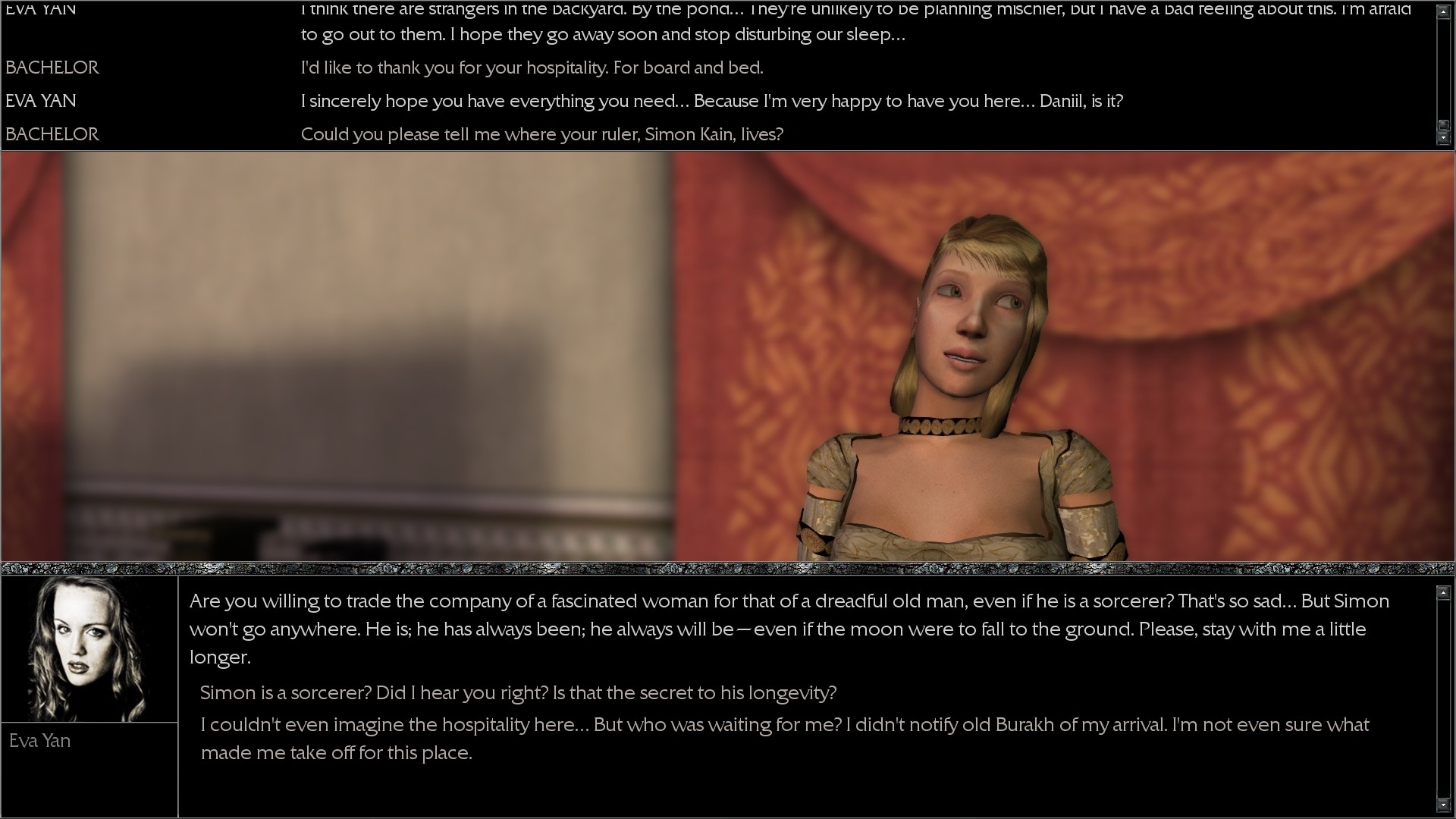
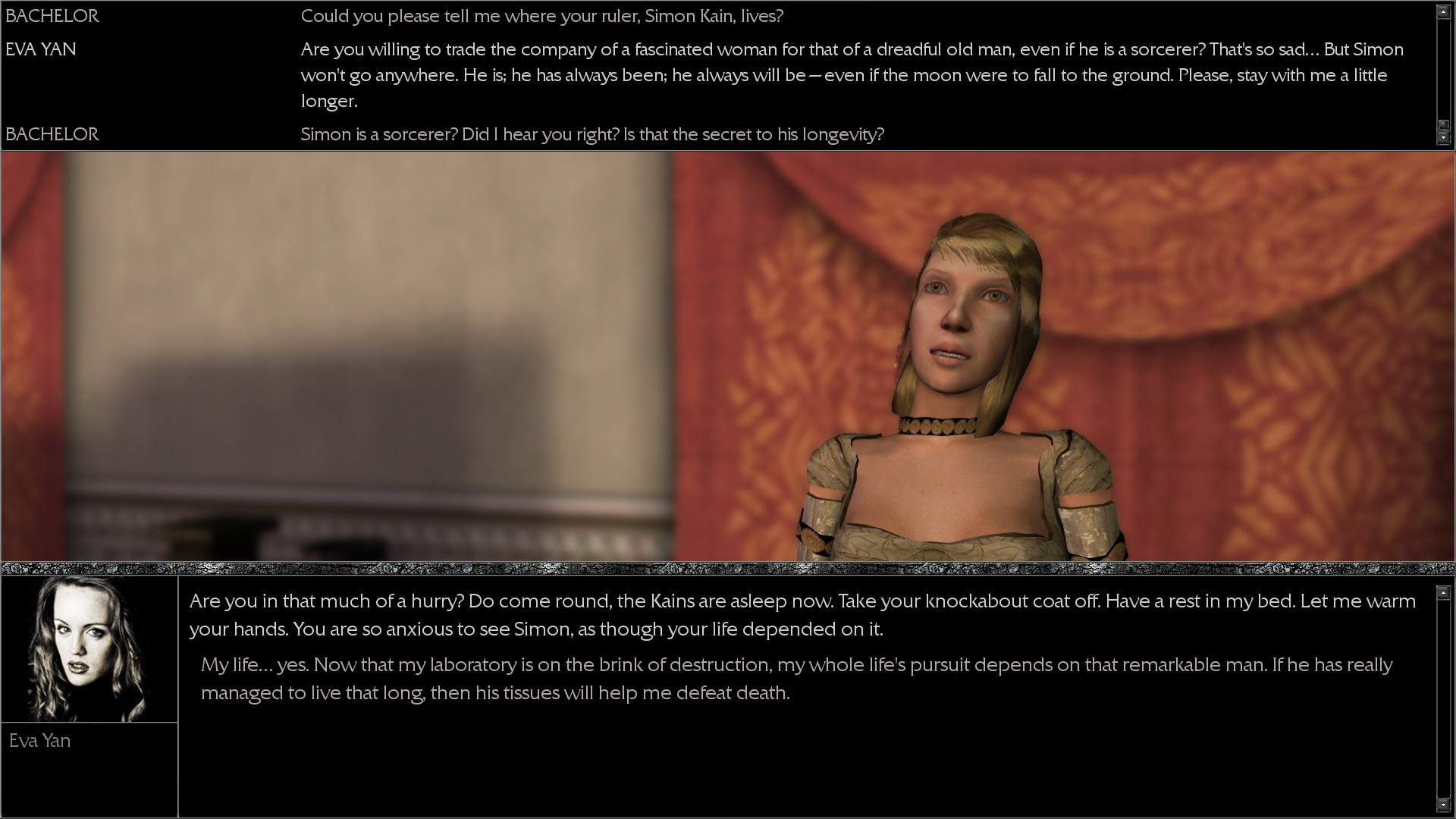
Eva Yan: Are you willing to trade the company of a fascinated woman for that of a dreadful old man, even if he is a sorcerer? That's so sad... But Simon won't go anywhere. He is; he always has been; he always will be - even if the moon were to fall to the ground. Please, stay with me a little longer.
Bachelor: Simon is a sorcerer? Did I hear you right? Is that the secret to his longevity?Eva Yan: Are you in that much of a hurry? Do come round, the Kains are asleep now. Take your knockabout coat off. Have a rest in my bed. Let me warm your hands. You are so anxious to see Simon, as though your life depended on it.
Bachelor: My life... yes. Now that my laboratory is on the brink of destruction, my whole life's pursuit depends on that remarkable man. If he really has managed to live that long, then his tissues will help me defeat death.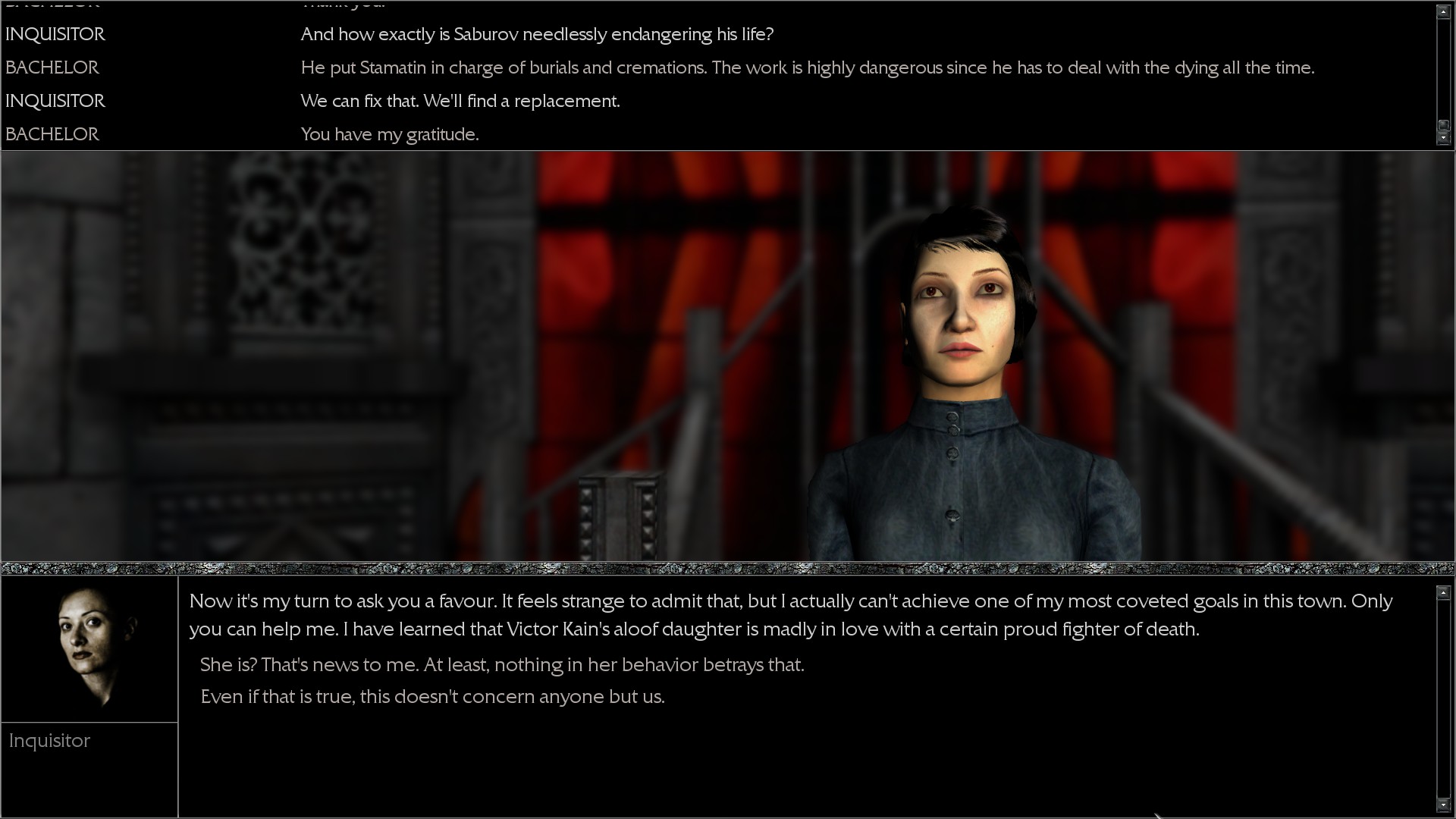
Inquisitor: Now it's my turn to ask you a favour. It feels strange to admit that, but I actually can't achieve one of my most coveted goals in this town. Only you can help me. I have learned that Victor Kain's aloof daughter is madly in love with a certain proud fighter of death.
Bachelor: She is? That's news to me. At least, nothing in her behavior betrays that.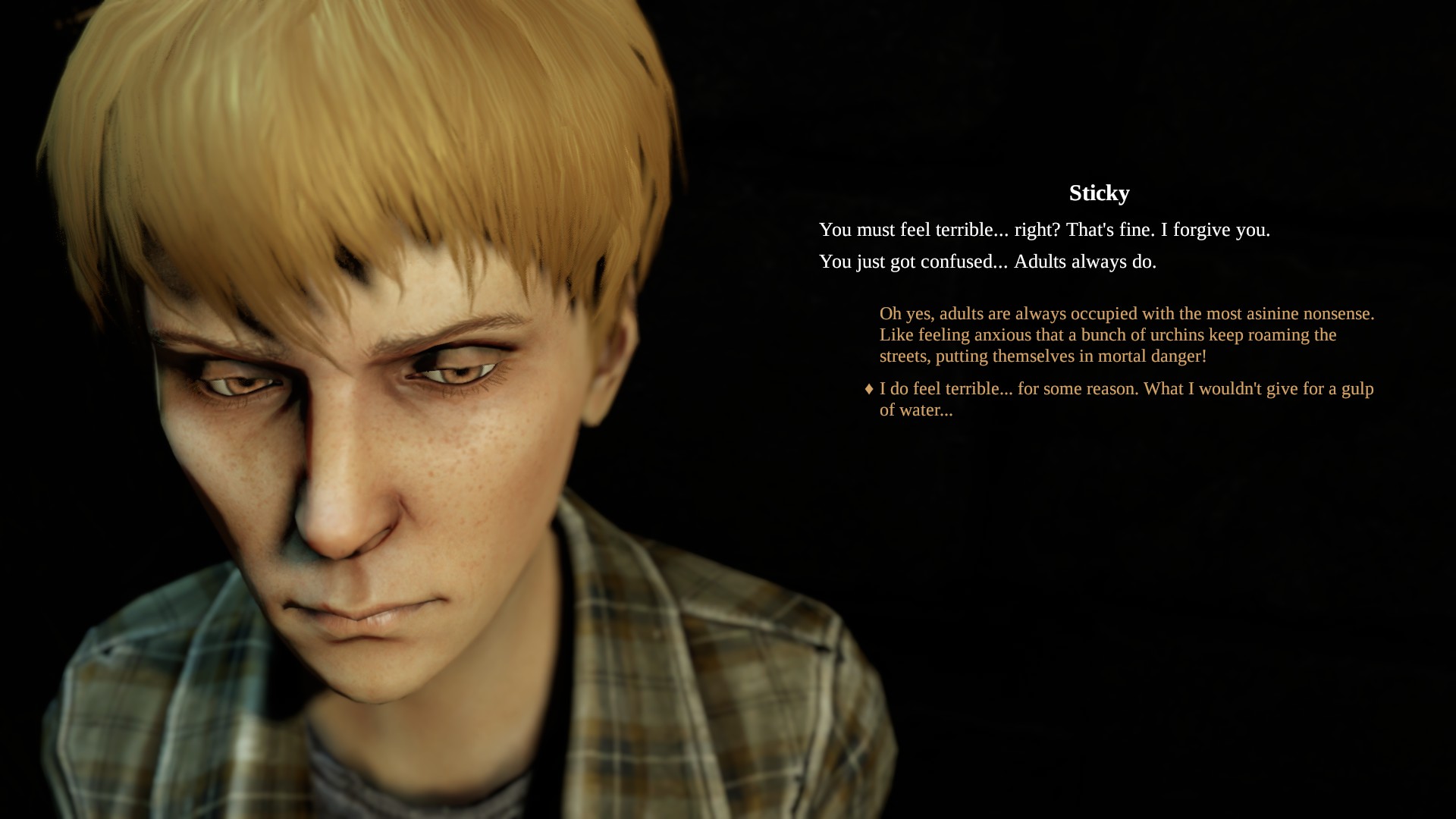
You must feel terrible... right? That's fine. I forgive you. You just got confused... Adults always do.
Oh yes, adults are always occupied with the most asinine nonsense. Like feeling anxious that a bunch of urchins keep roaming the streets, putting themselves in mortal danger!
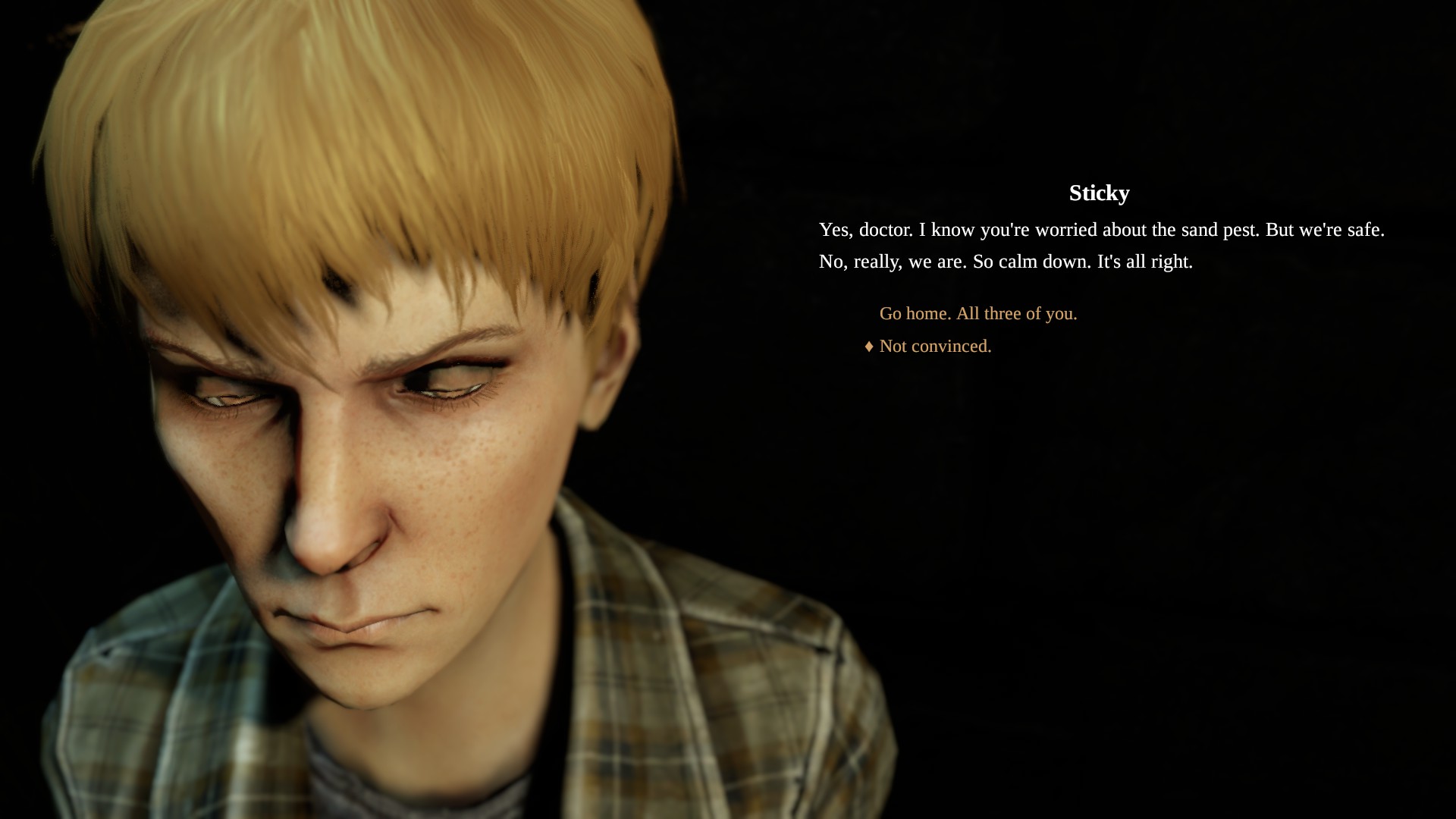
Yes, doctor. I know you're worried about the sand pest. But we're safe. No, really, we are. So calm down. It's all right.
Go home. All three of you.
Reduced Sharing of Interests, Emotions, or Affect
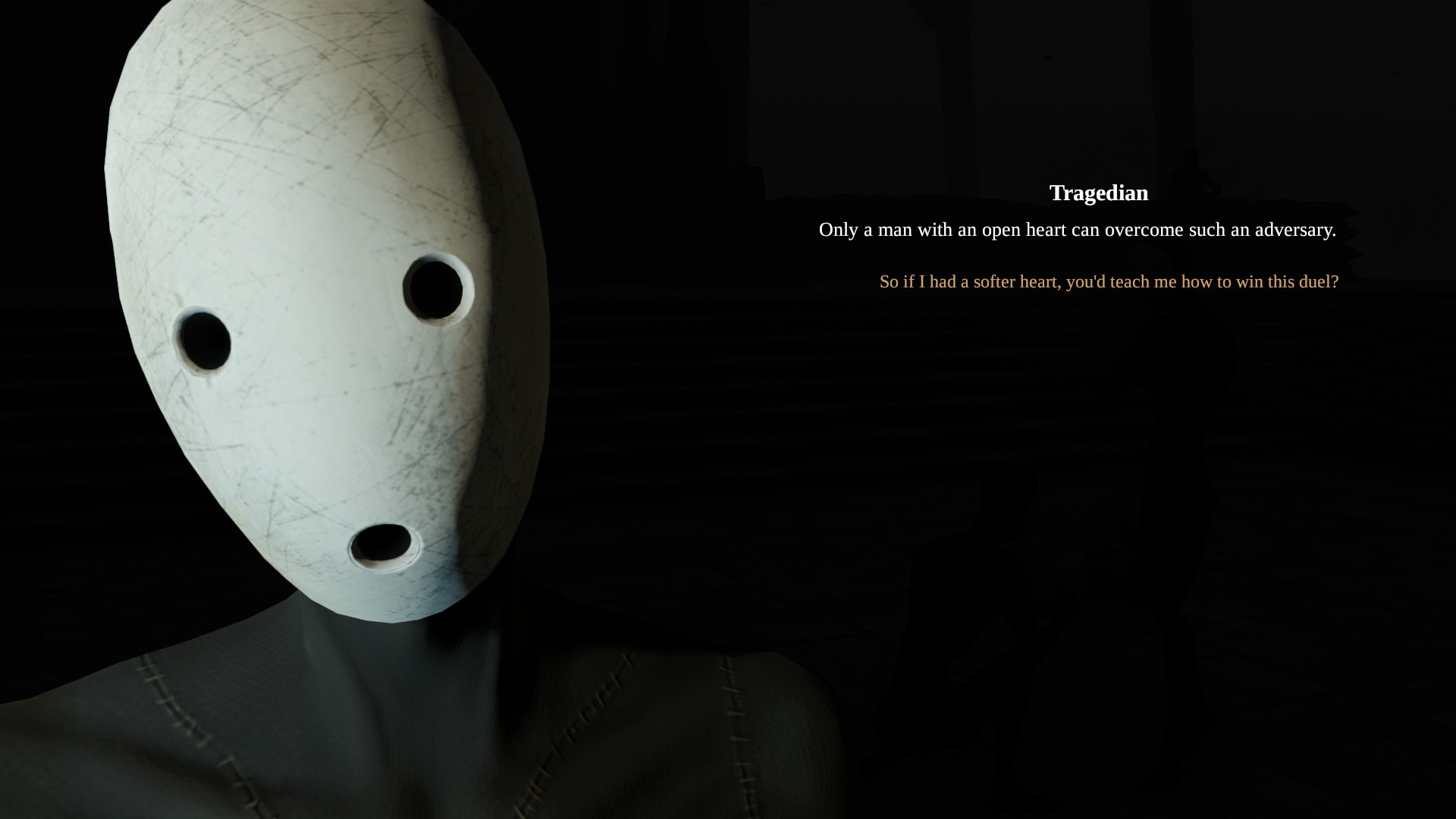
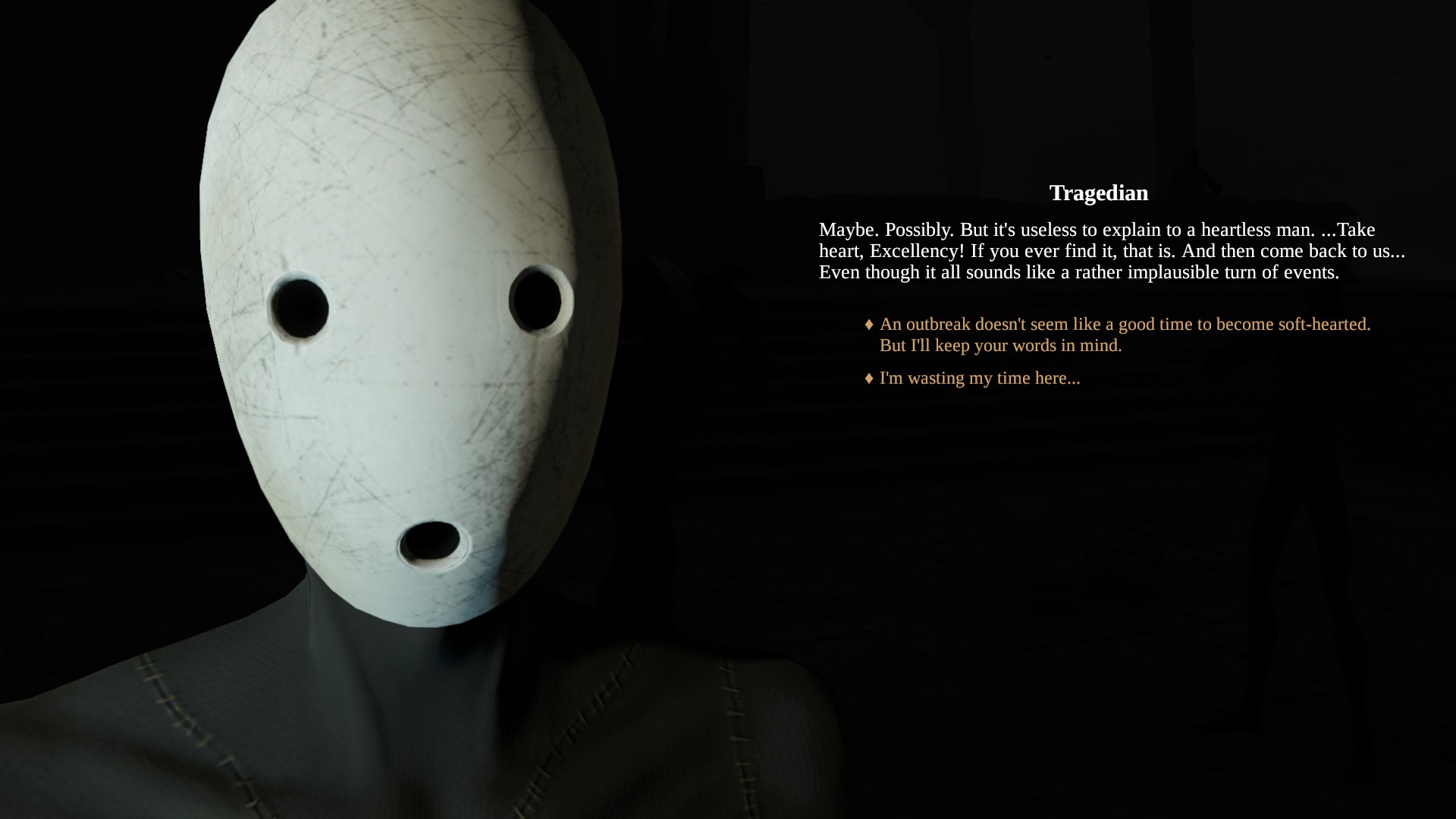
Tragedian: Only a man with an open heart can overcome such an adversary.
Bachelor: So if I had a softer heart, you'd teach me how to win this duel?Tragedian: Maybe. Possibly. But it's useless to explain to a heartless man. ...Take heart, Excellency! If you ever find it, that is. And then come back to us... Even though it all sounds like a rather implausible turn of events.
Bachelor: An outbreak doesn't seem like a good time to become soft-hearted. But I'll keep your words in mind.
I'm wasting my time here...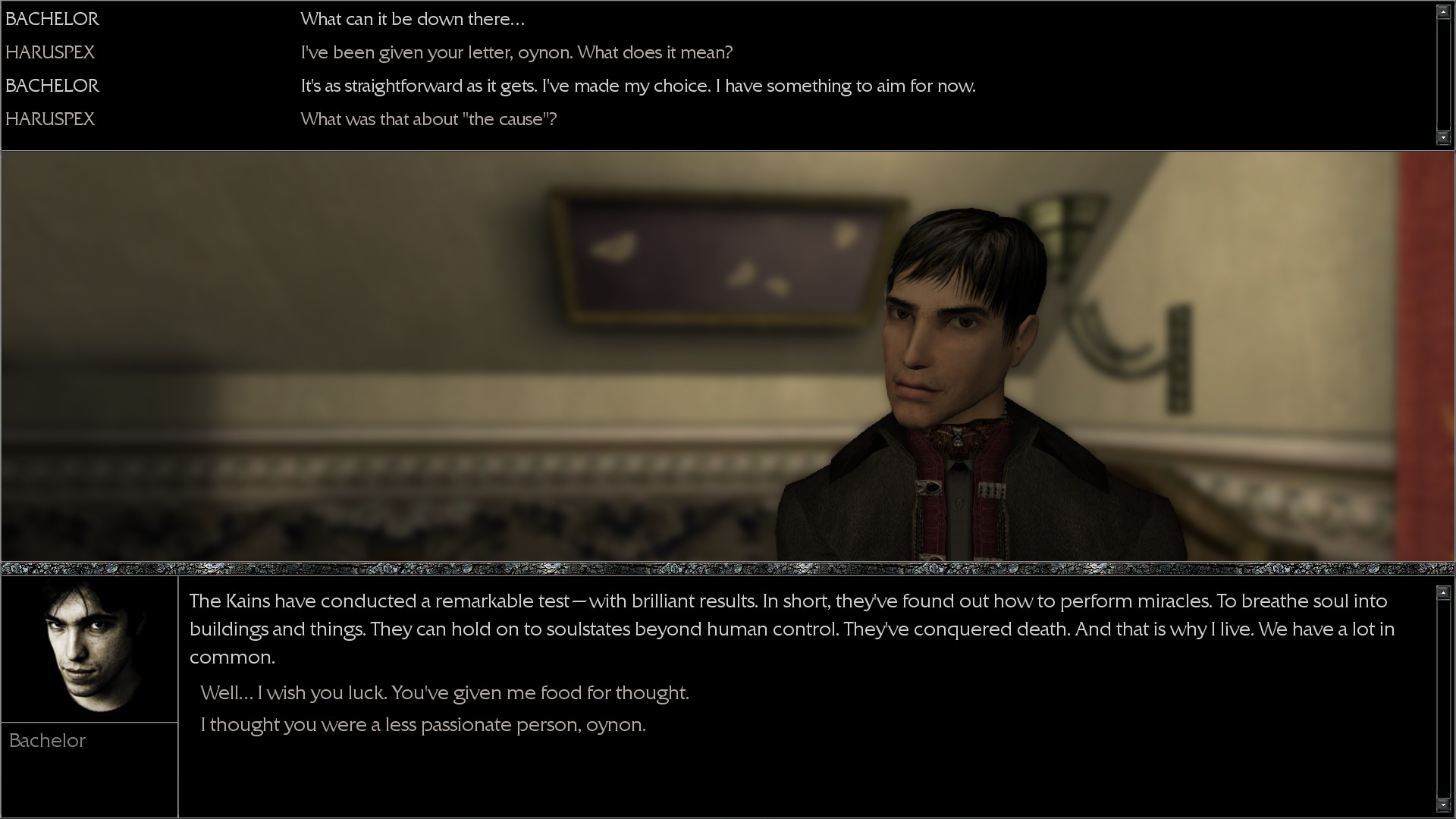
Bachelor: The Kains have conducted a remarkable test - with brilliant results. In short, they've found out how to perform miracles. To breathe soul into buildings and things. They can hold on to soulstates beyond human control. They've conquered death. And that is why I live. We have a lot in common.
Haruspex: I though you were a less passionate person, oynon.Abnormal Social Approach
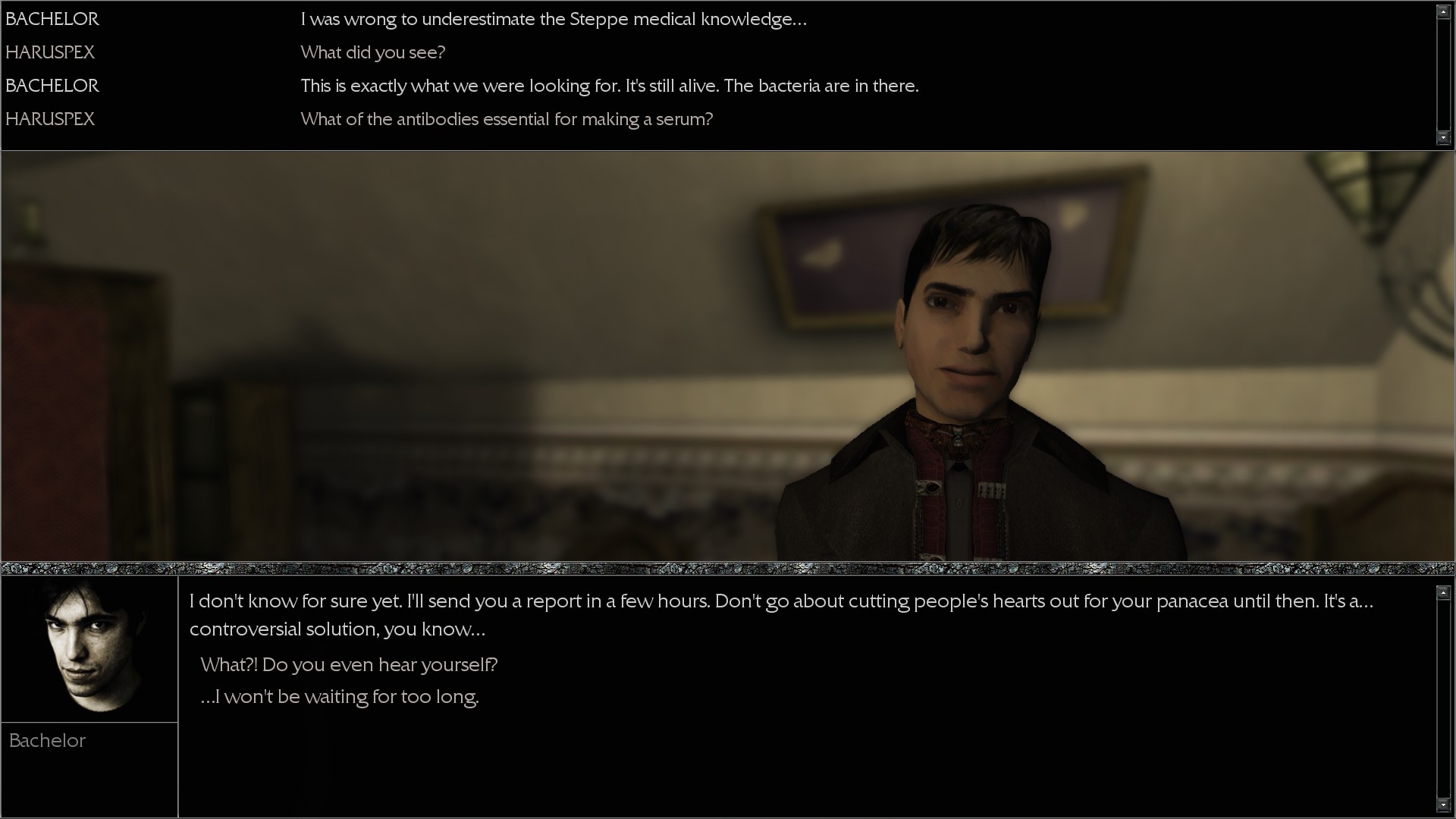
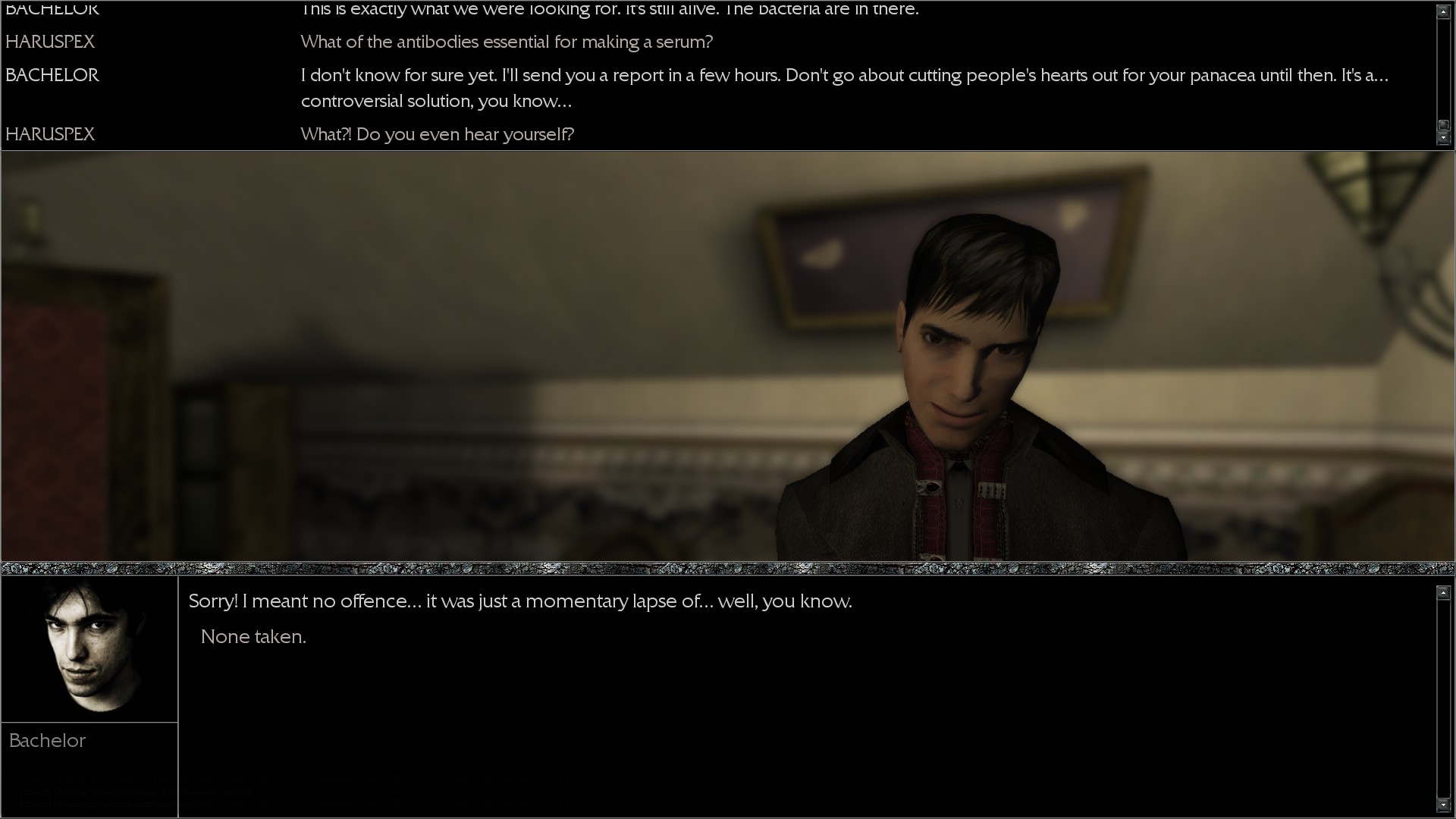
Bachelor: I don't know for sure yet. I'll send you a report in a few hours. Don't go about cutting people's hearts out for your panacea until then. It's a... controversial solution, you know...
Haruspex: What?! Do you even hear yourself?Bachelor: Sorry! I meant no offence... it was just a momentary lapse of... well, you know.
Haruspex: None taken.
From you? Oh, nothing. I was just sharing.
Abnormalities in Eye Contact and Body Language
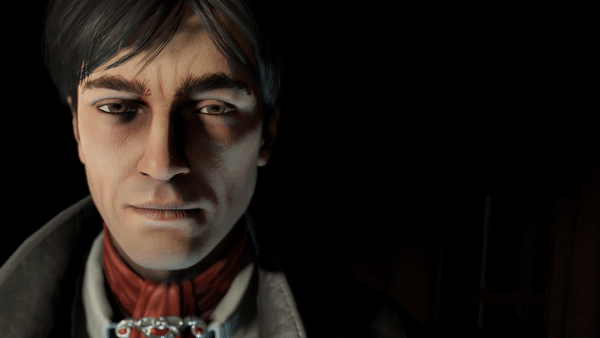
Deficits in Understanding Relationships
Eva Yan: Andrey Stamatin, the architect. He is a very menacing and strong man. He treats me in a slightly condescending manner, but you can speak to him on my behalf, he won't refuse; and I think even Andrey doesn't want to rot of the Sand Plague.
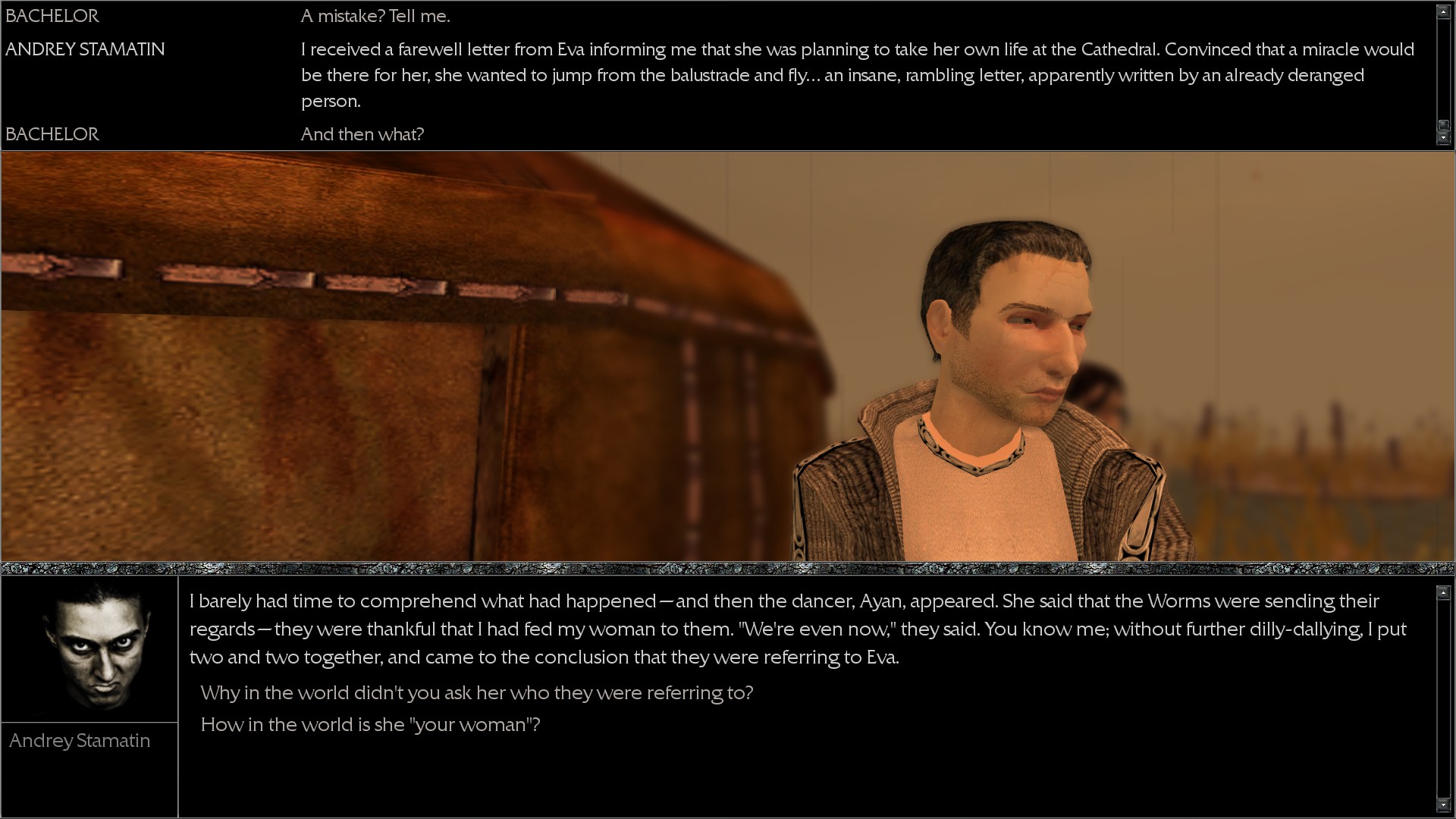
Andrey Stamatin: I barely had time to comprehend what had happened - and then the dancer, Ayan, appeared. She said that the Worms were sending their regards - they were thankful that I had fed my woman to them. "We're even now," they said. You know me; without f urther dilly-dallying, I put two and two together, and came to the conclusion that they were referring to Eva.
Bachelor: How in the world is she "your woman"?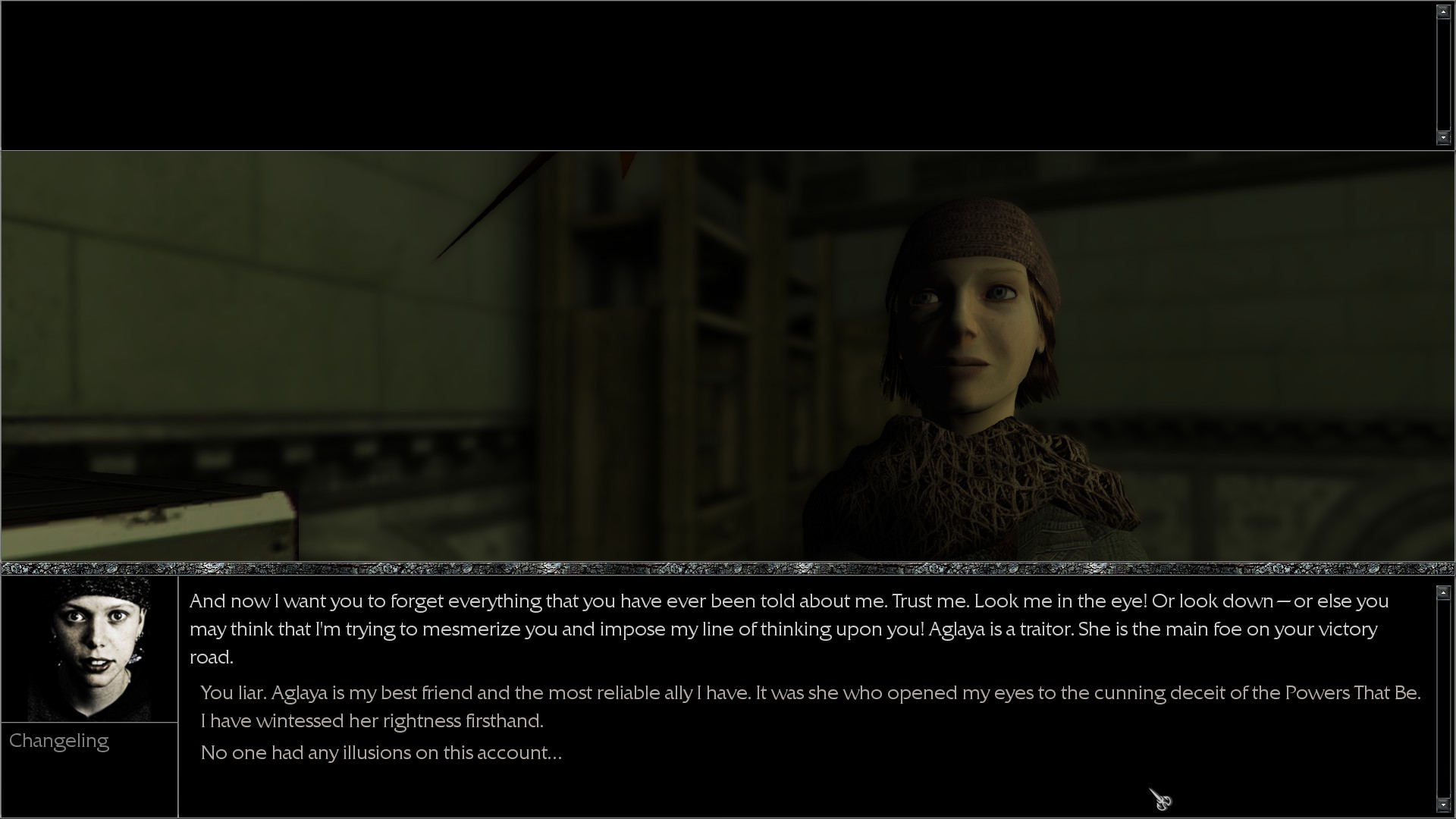
Changeling: [...] Aglaya is a traitor. She is the main foe on your victory road.
Bachelor: You liar. Aglaya is my best friend and most reliable ally I have. It was she who opened my eyes to the cunning deceit of the Powers That Be. I have witnessed her rightness firsthand.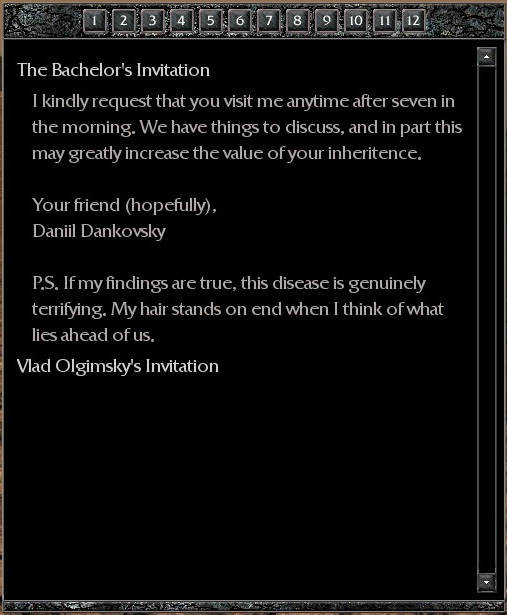
The Bachelor's Invitation
I kindly request that you visit me anytime after seven in the morning. We have things to discuss, and in part this may greatly increase the value of your inheritence.
Your friend (hopefully),
Daniil Dankovsky
P.S. If my findings are true, this disease is genuinely terrifying. My hair stands on end when I think of what lies ahead of us.Difficulties Adjusting Behavior to Suit Various Social Contexts
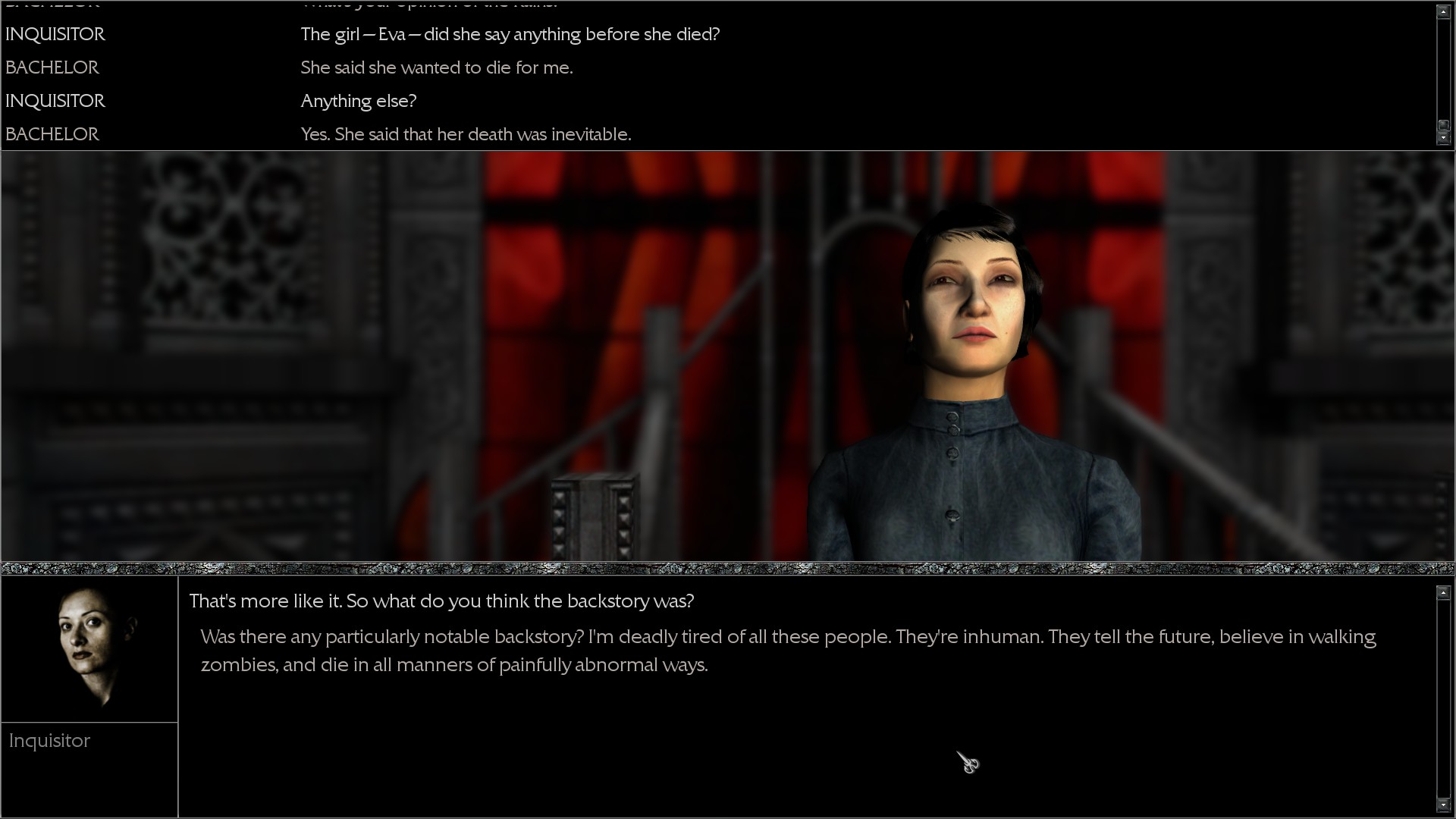
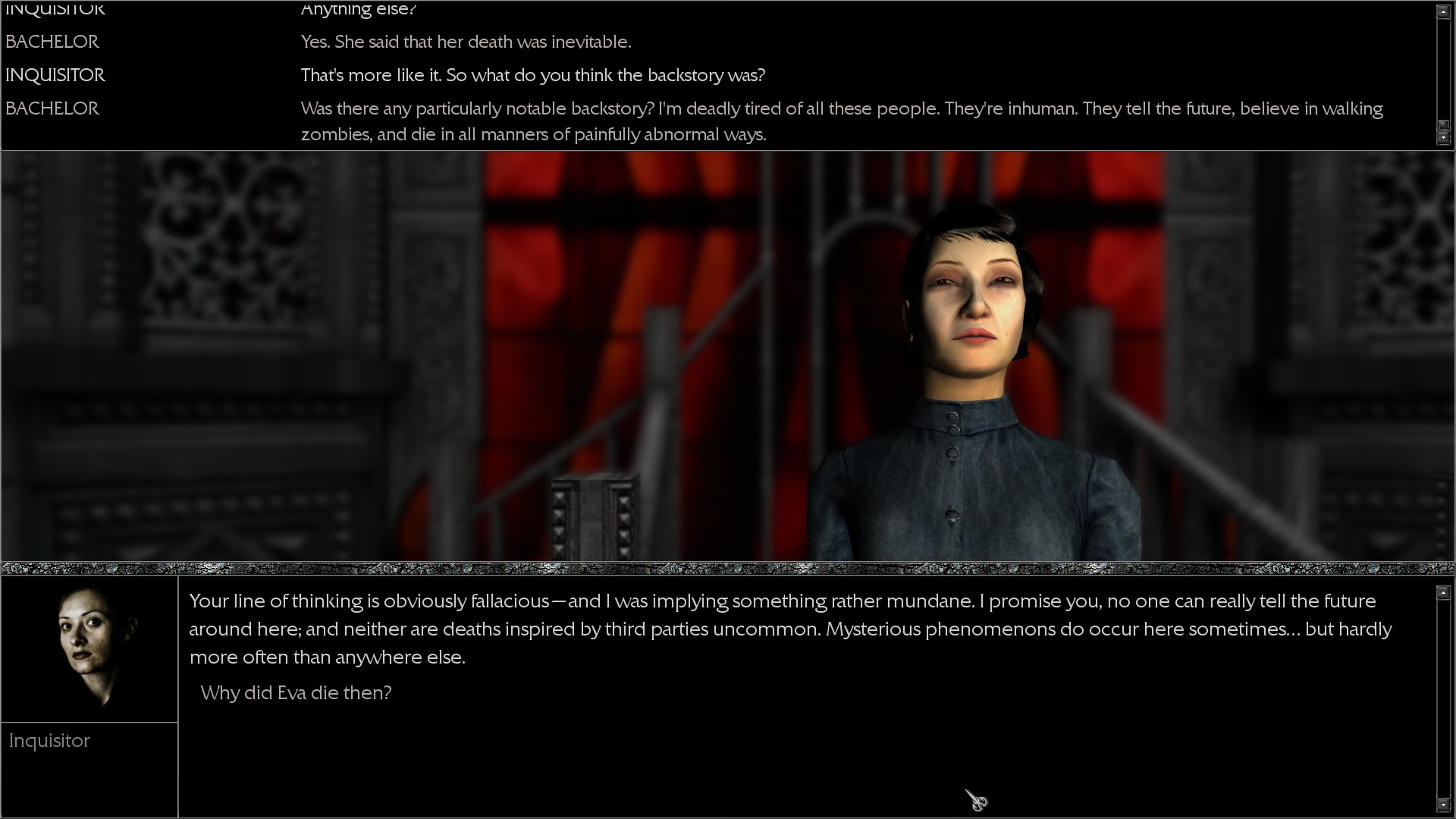
Bachelor: Was there any particularly notable backstory? I'm deadly tired of all these people. They're inhuman. They tell the future, believe in walking zombies, and die in all manners of painfully abnormal ways.
Inquisitor: Your line of thinking is obviously fallacious - and I was implying something rather mundane. I promise you, no one can really tell the future around here; and neither are deaths inspired by third parties uncommon. Mysterious phenomenons do occur here sometimes... but hardly more often than anywhere else.
Bachelor: Why did Eva die then?
Damn this town... I feel I'm trapped in a nightmare. The absurdity of it all... There's no one to talk to. Everyone's so volatile.
They all seem to want to help, but... their help is worse than hostility.Repetitive Motor Movements or Speech
Rigid Thinking Patterns
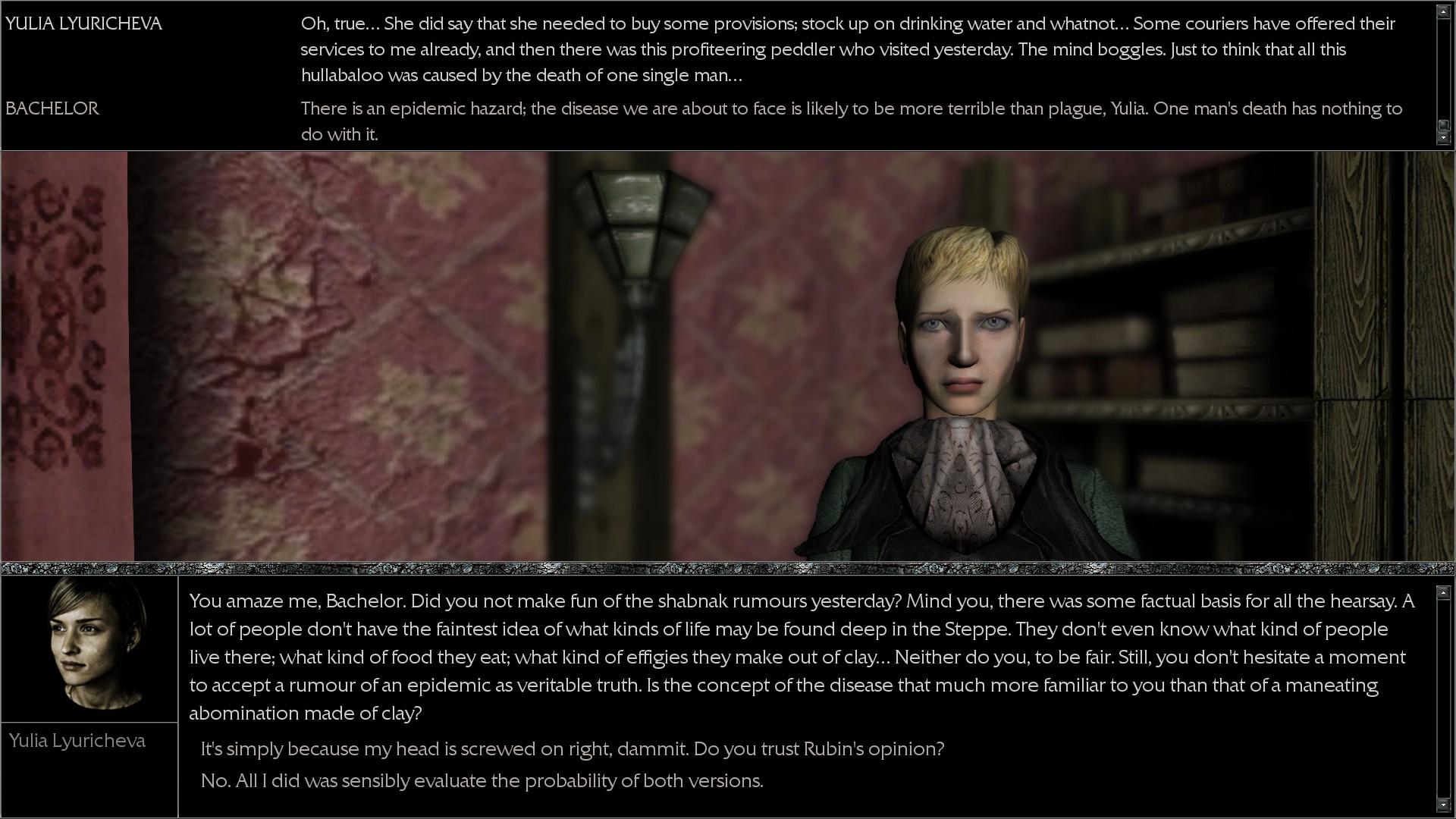
You amaze me, Bachelor. Did you not make fun of the shabnak rumours yesterday? Mind you, there was some factual basis for all the hearsay. A lot of people don't have the faintest idea of what kinds of life may be found deep in the Steppe. They don't even know what kind of people live there; what kind of food they eat; what kind of effigies they make out of clay... Neither do you, to be fair. Still, you don't hesitate a moment to accept a rumour of an epidemic as veritable truth. Is the concept of the disease that much more familiar to you than that of a maneating abomination of clay?
Highly Restricted, Fixated Interests That Are Abnormal in Intensity or Focus
Hyper- or Hyporeactivity to Sensory Input
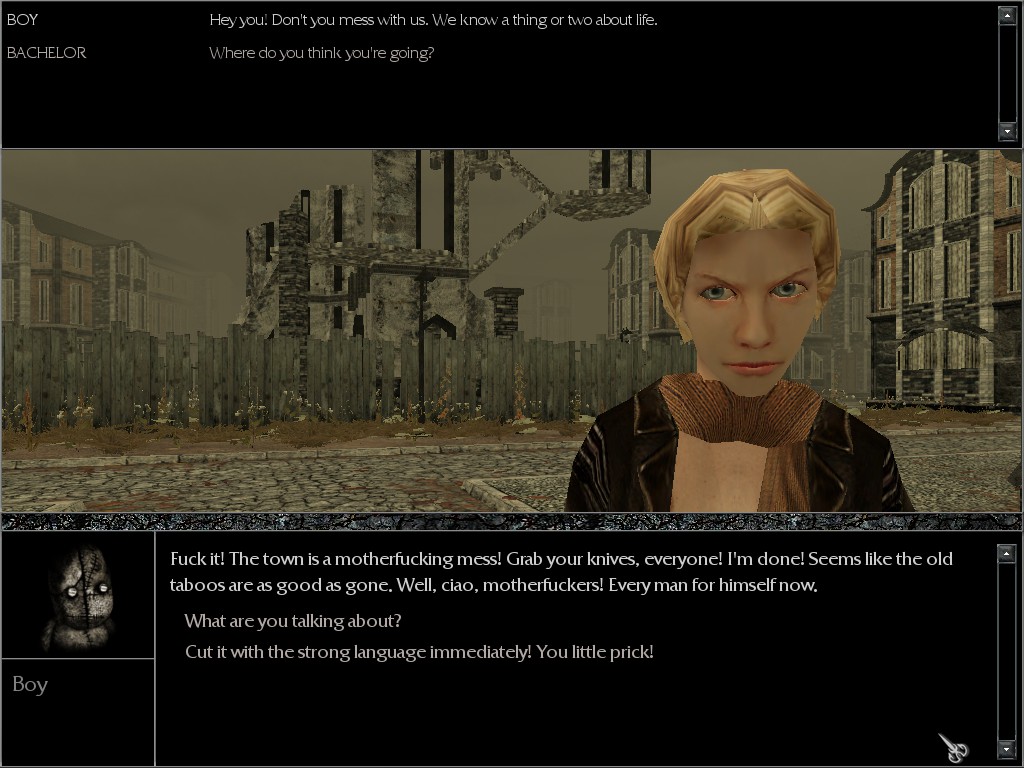
Boy: Fuck it! The town is a motherfucking mess! Grab your knives, everyone! I'm done! Seems like the old taboos are as good as gone. Well, ciao, motherfuckers! Every man for himself now.
Bachelor: Cut it with the strong language immediately! You little prick!Additional Observations
Difficulty Lying
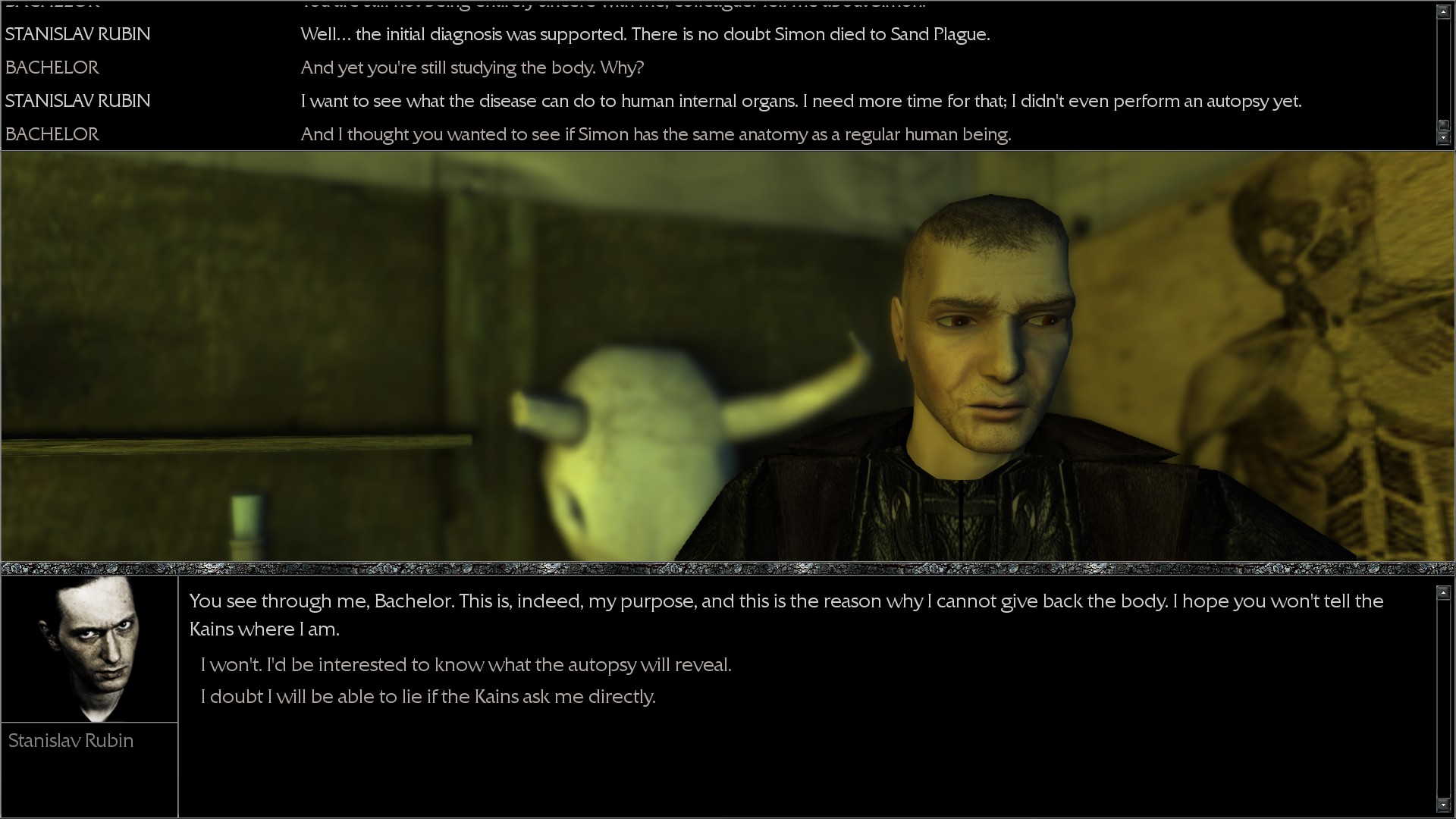
Stanislav Rubin: You see through me, Bachelor. This is, indeed, my purpose, and this is the reason why I cannot give back the body. I hope you won't tell the Kains where I am.
Bachelor: I doubt I will be able to lie if the Kains ask me directly.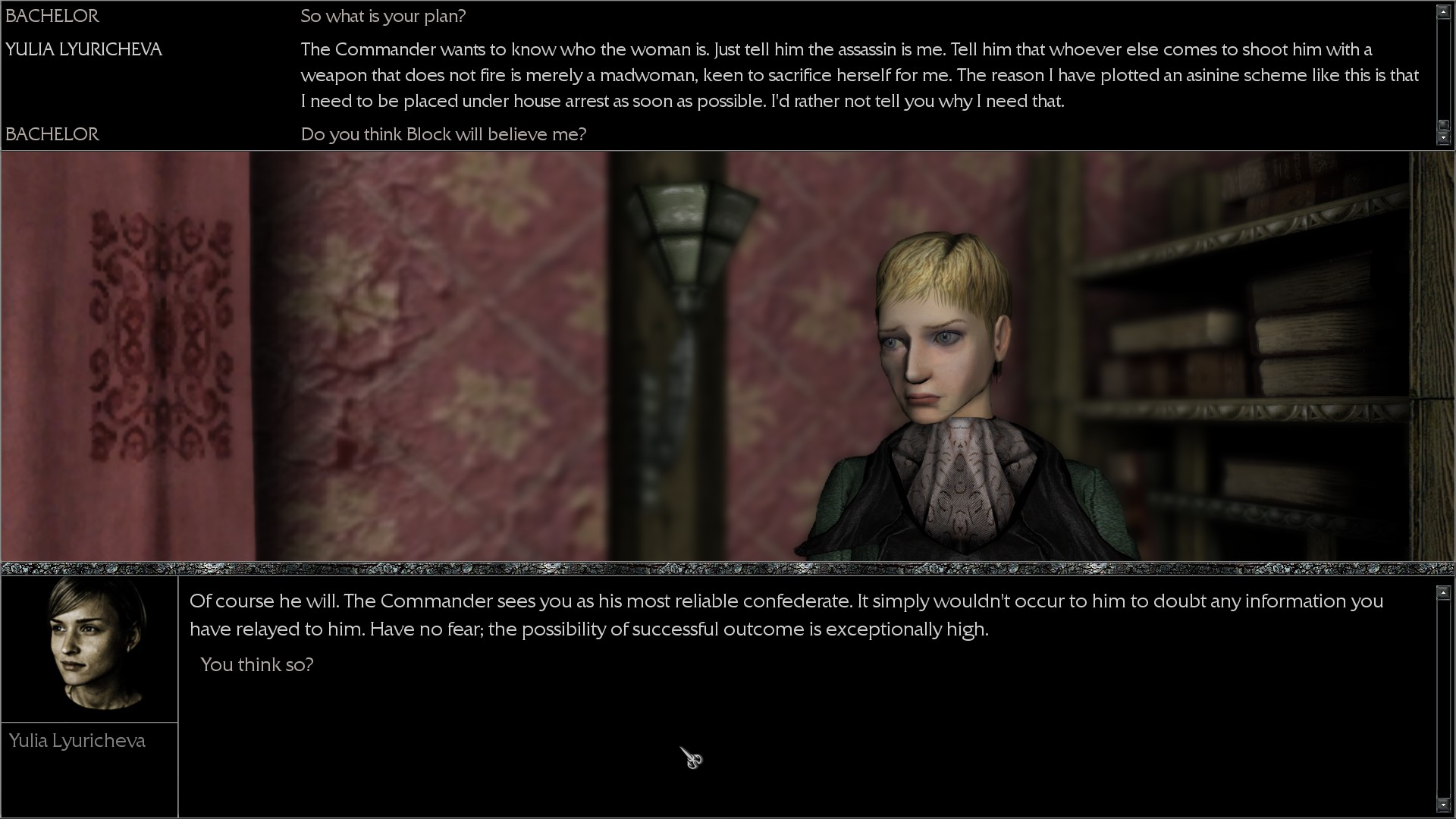
Yulia Lyuricheva: Of course he will. The Commander sees you as his most reliable confederate. It simply wouldn't occur to him to doubt any information you have relayed to him. Have no fear: the possibility of successful outcome is exceptionally high.
Bachelor: You think so?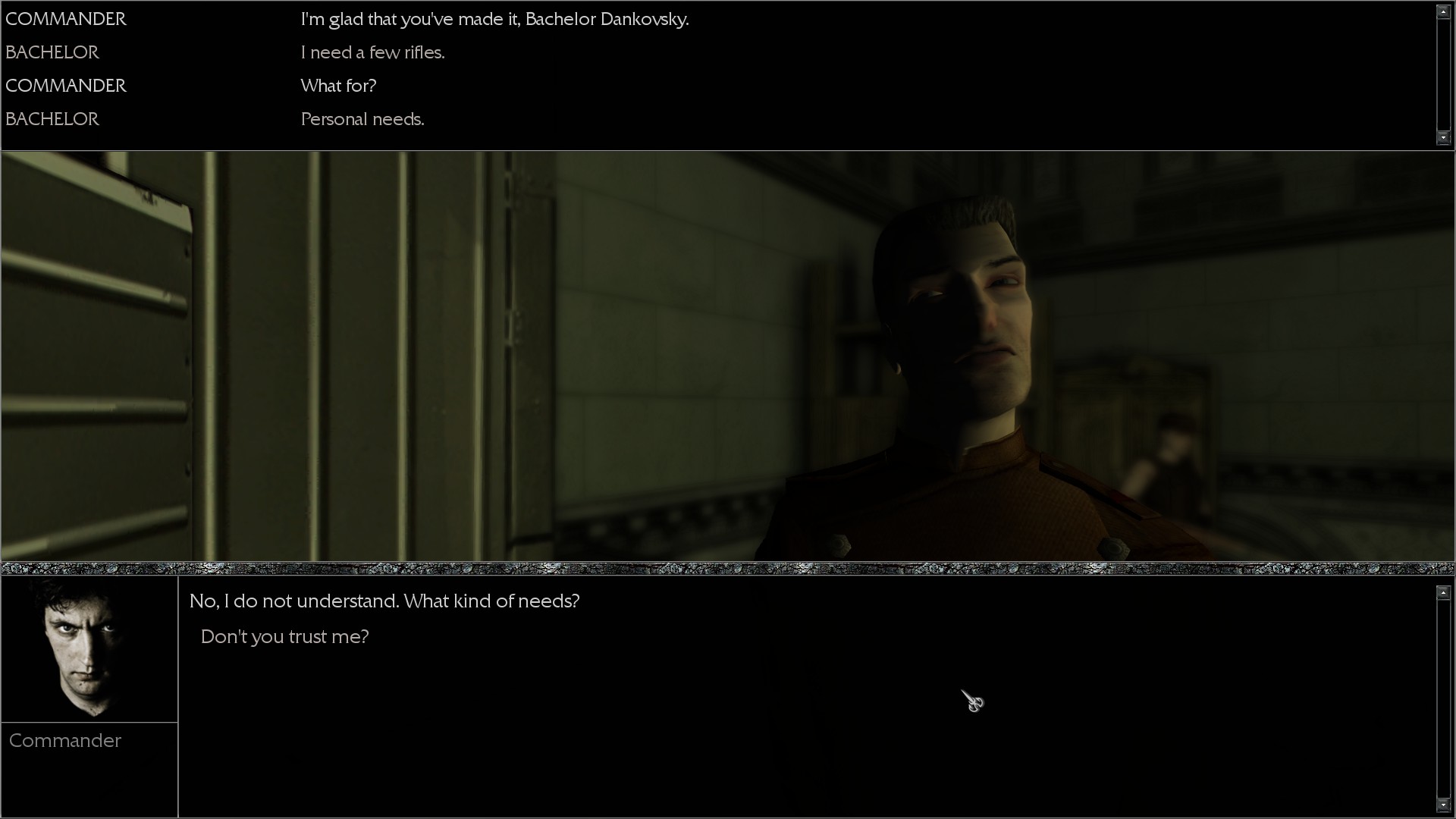
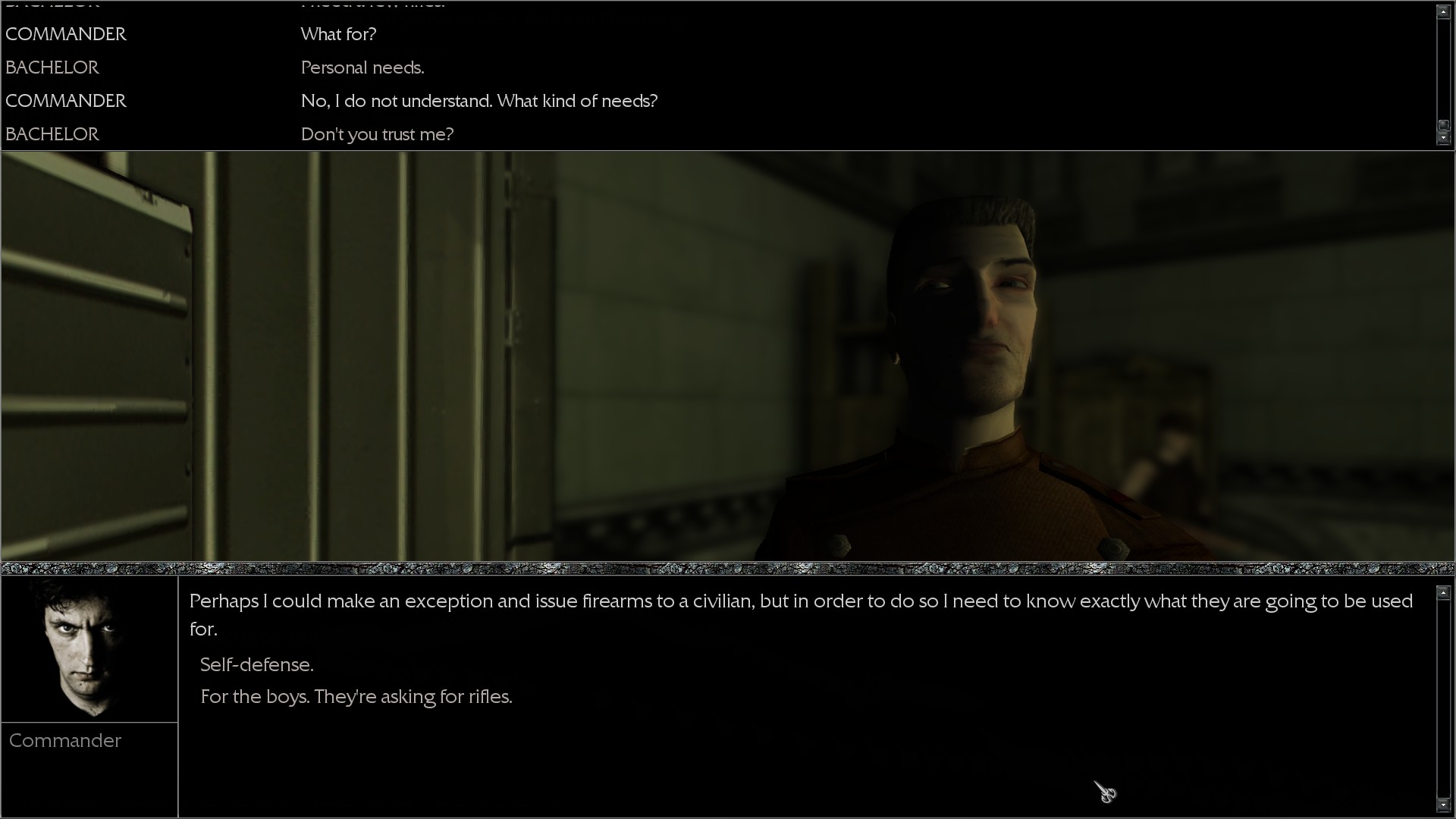
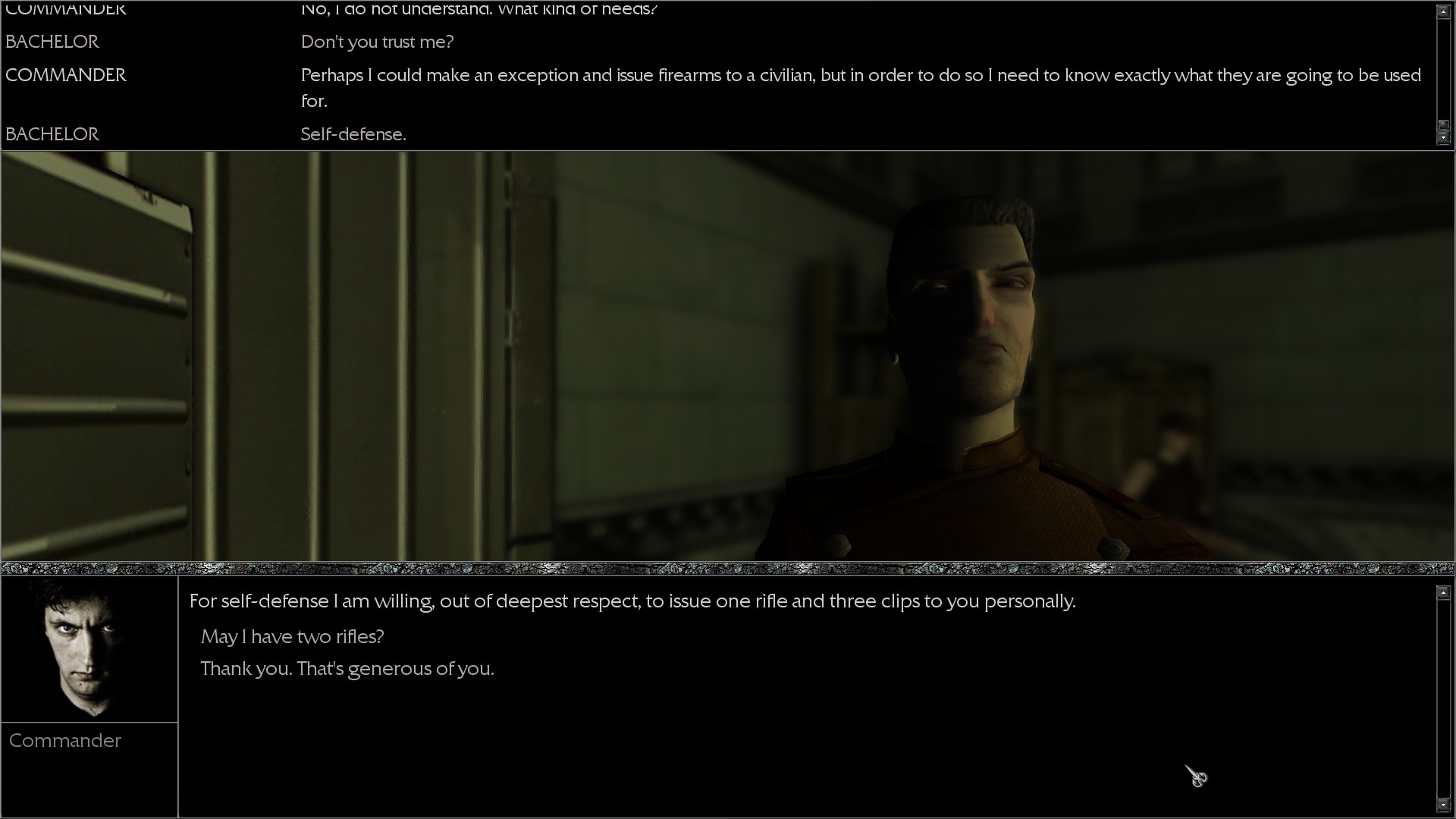
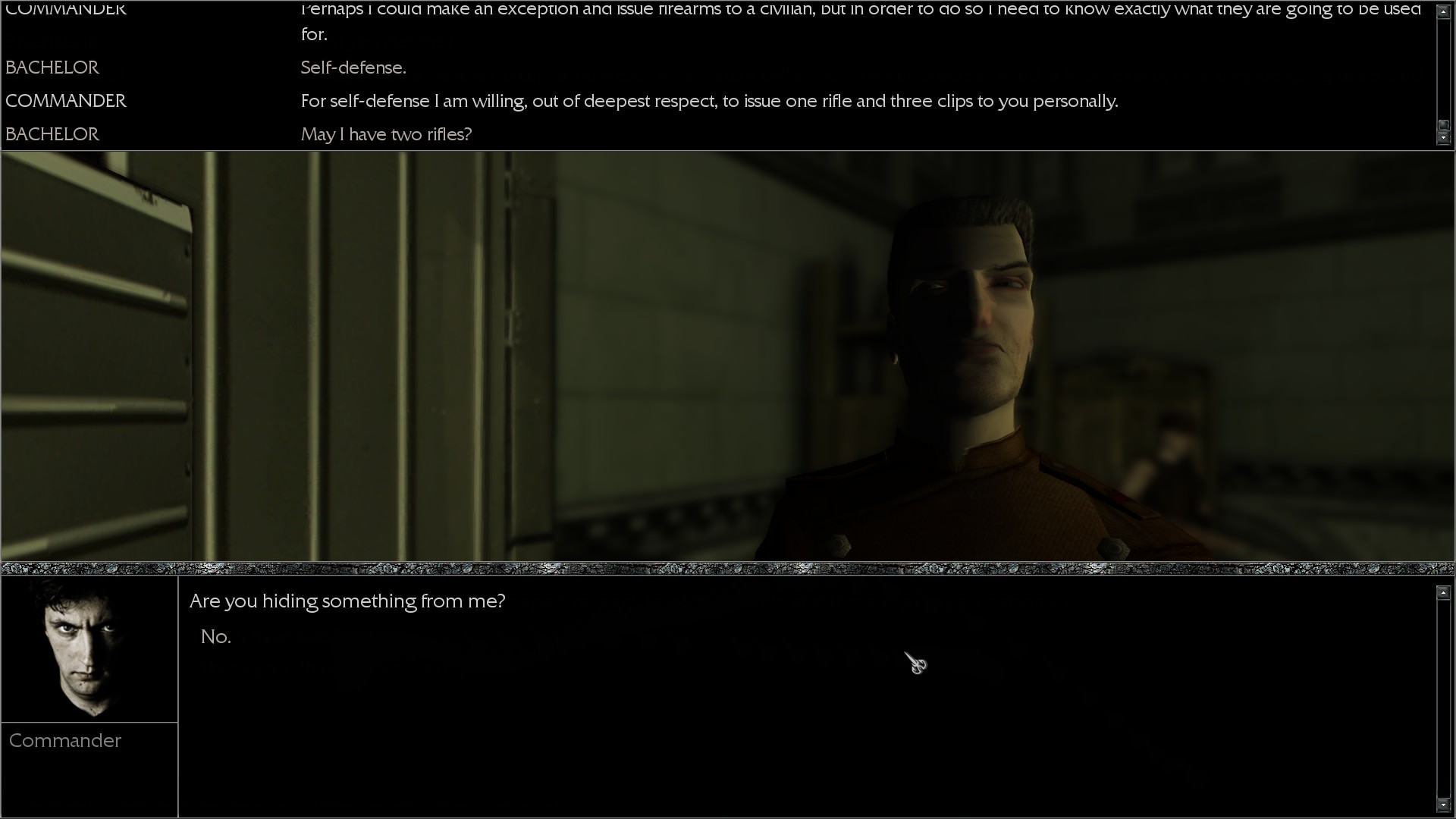
Bachelor: I need a few rifles.
Commander: What for?
Bachelor: Personal needs.
Commander: No, I do not understand. What kind of needs?
Bachelor: Don't you trust me?
Commander: Perhaps I could make an exception and issue firearms to a civilian, but in order to do so I need to know exactly what they are going to be used for.
Bachelor: Self-defense.
Commander: For self-defense I am willing, out of deepest respect, to issue one rifle and three clips to you personally.
Bachelor: May I have two rifles?
Commander: Are you hiding something from me?
Bachelor: No.Having Trouble Understanding What [is Meant]
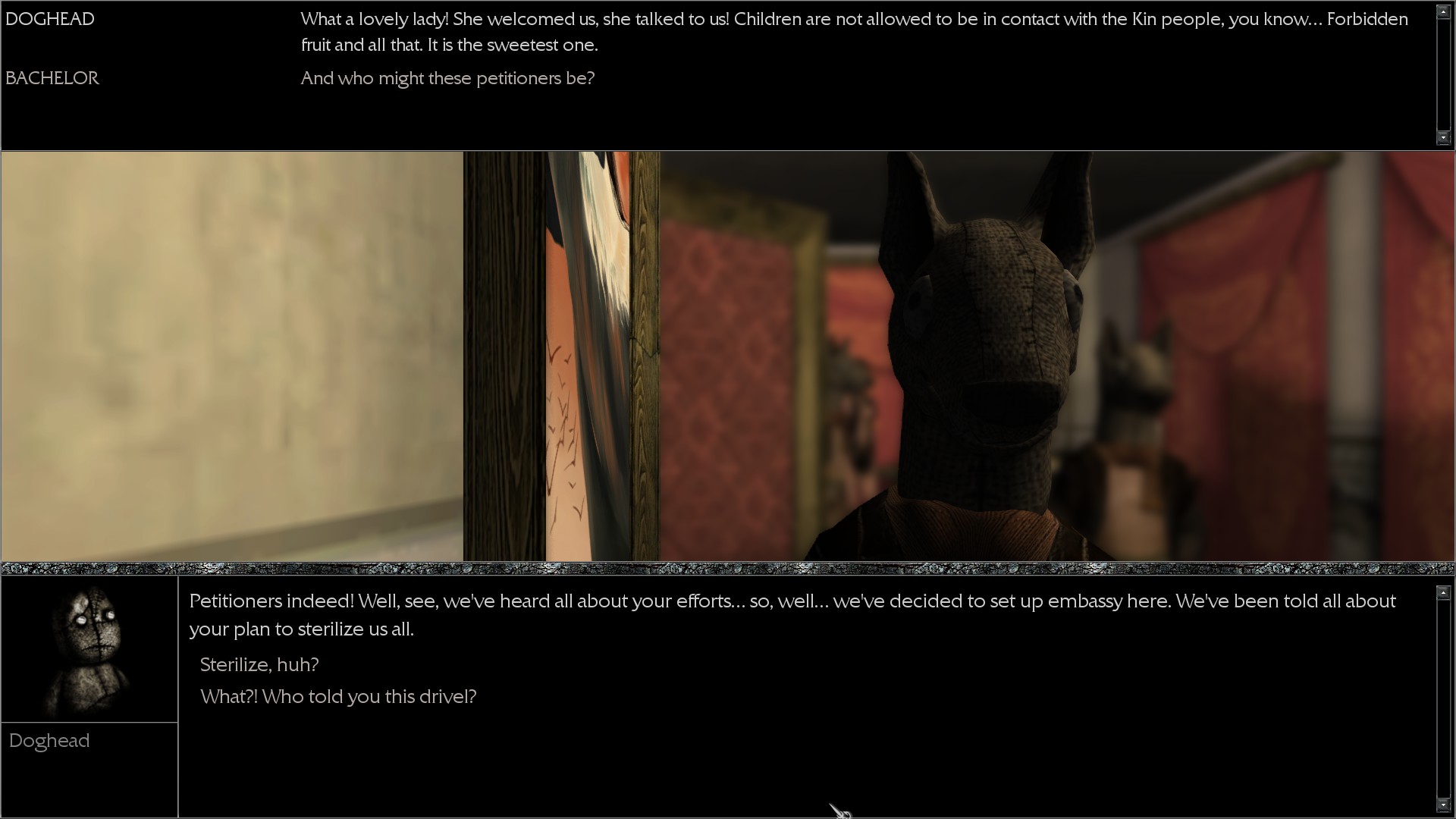
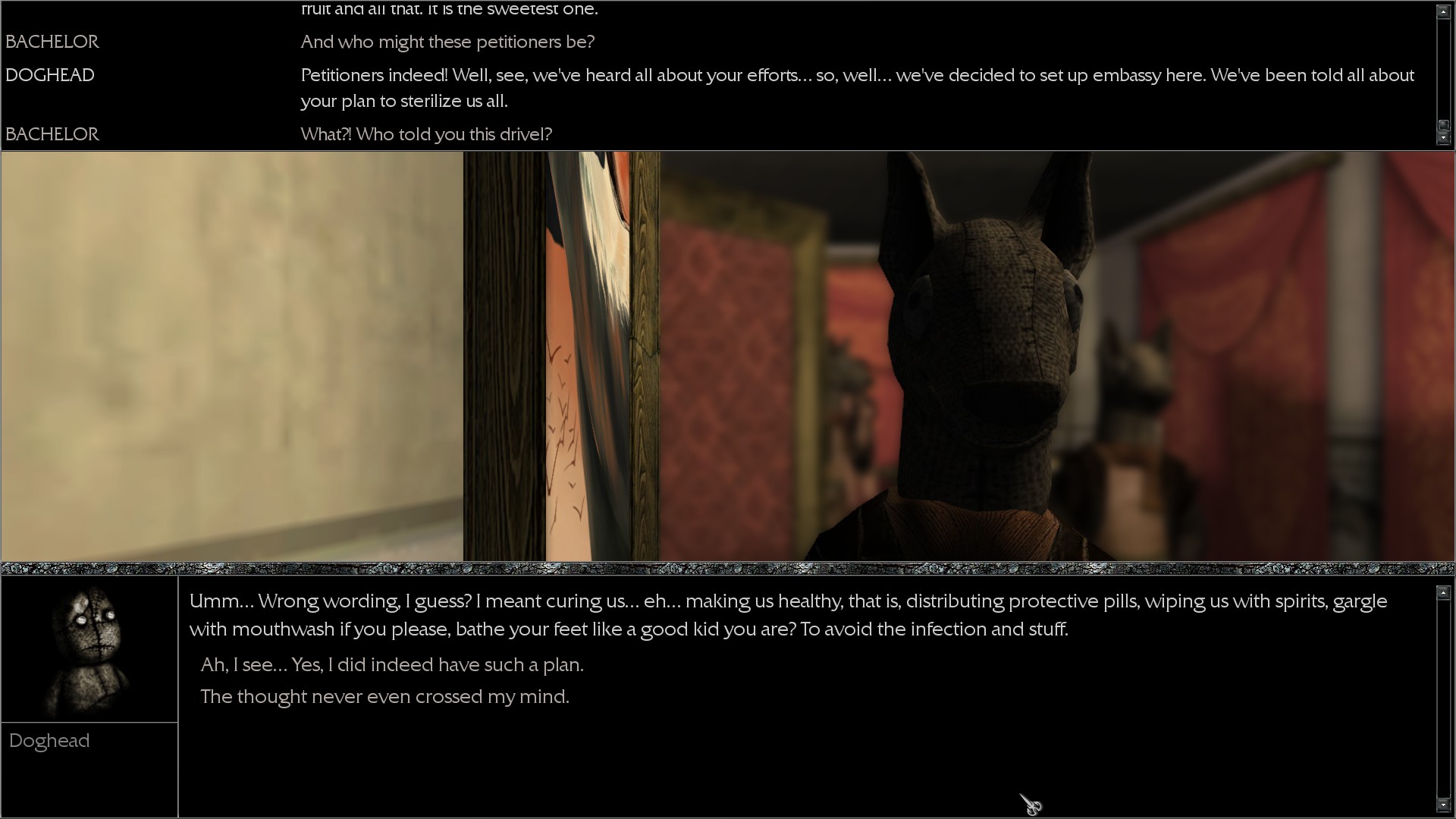
Doghead: Petitioners indeed! Well, see, we've heard all about your efforts... so, well... we've decided to set up embassy here. We've been told all about your plan to sterilize us all.
Bachelor: What?! Who told you this drivel?
Doghead: Umm... Wrong wording, I guess? I meant curing us... eh... making us healthy, that is, distributing protective pills, wiping us with spirits, gargle with mouthwash if you please, bathe your feet like a good kid you are? To avoid the infection and stuff.
Bachelor: Ah, I see... Yes, I did indeed have such a plan.

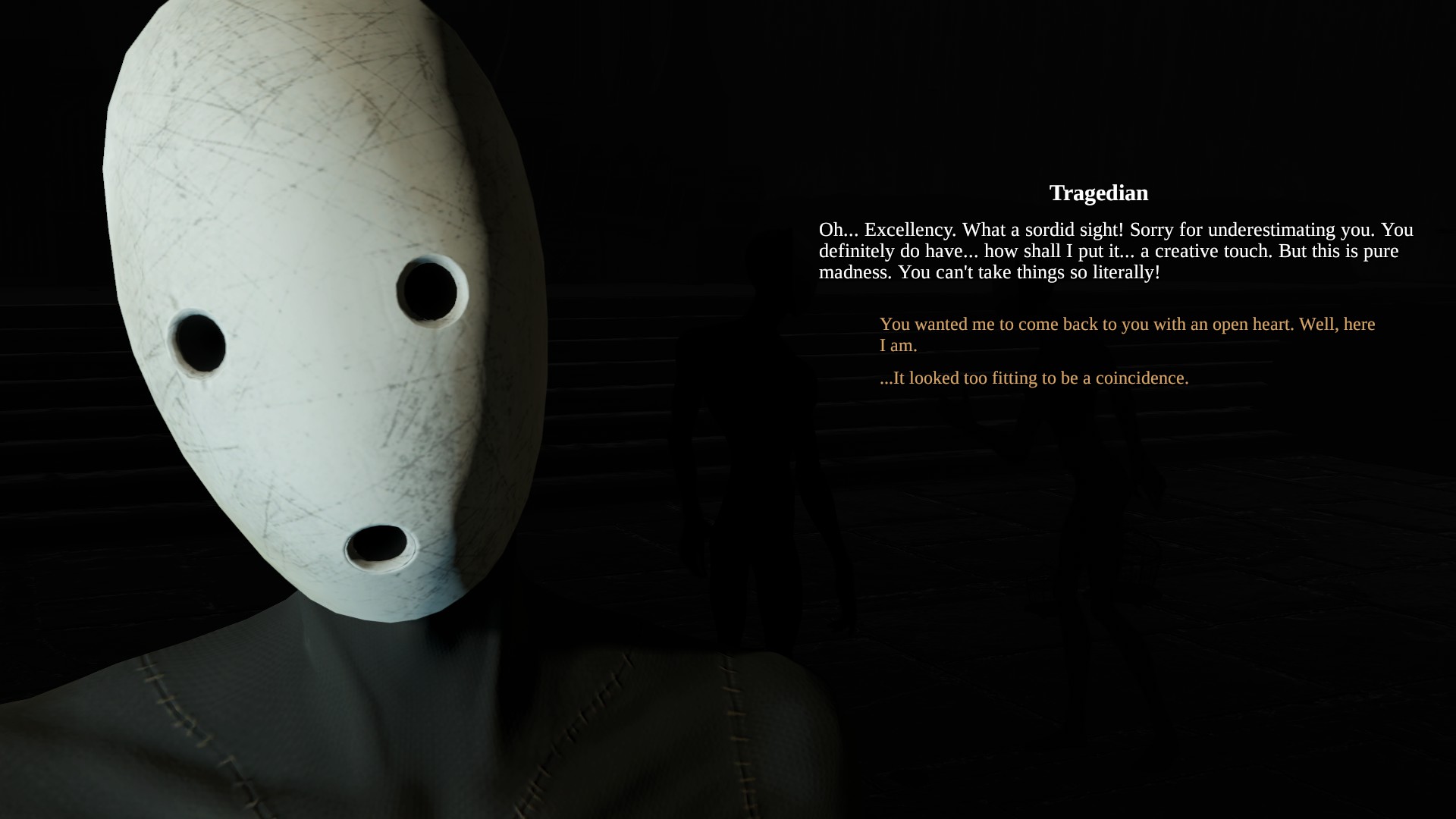
Tragedian: Oh... Excellency. What a sordid sight! Sorry for underestimating you. You definitely do have... how shall I put it... a creative touch. But this is pure madness. You can't take things so literally!
Bachelor: You wanted me to come back to you with an open heart. Well, here I am.
...It looked too fitting to be a coincidence.
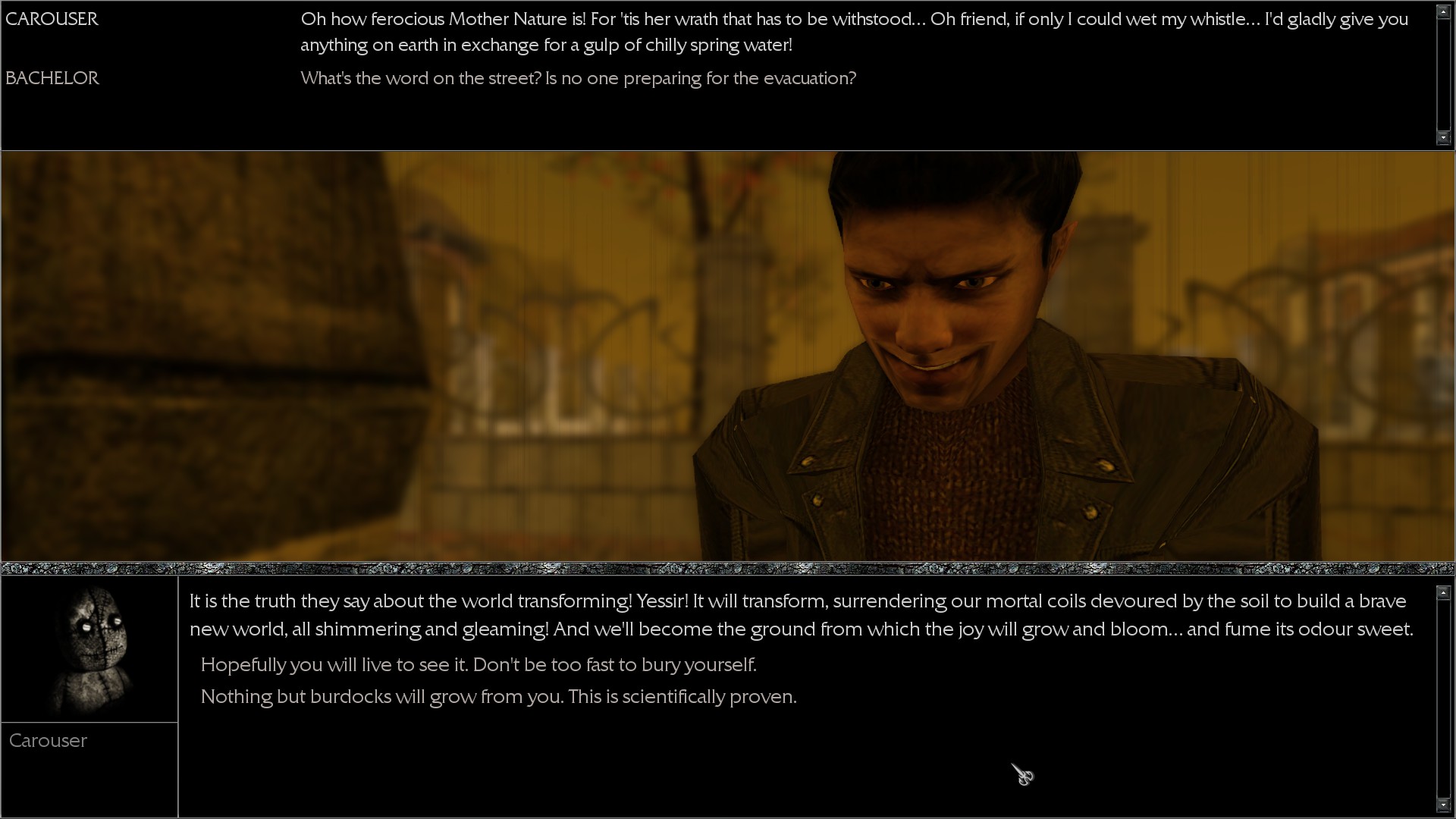
Carouser: It is the truth they say about the world transforming! Yessir! It will transform, surrendering our mortal coils devoured by the soil to build a brave new world, all shimmering and gleaming! And we'll become the ground from which the joy will grow and bloom... and fume its odour sweet.
Bachelor: Nothing but burdocks will grow from you. This is scientifically proven.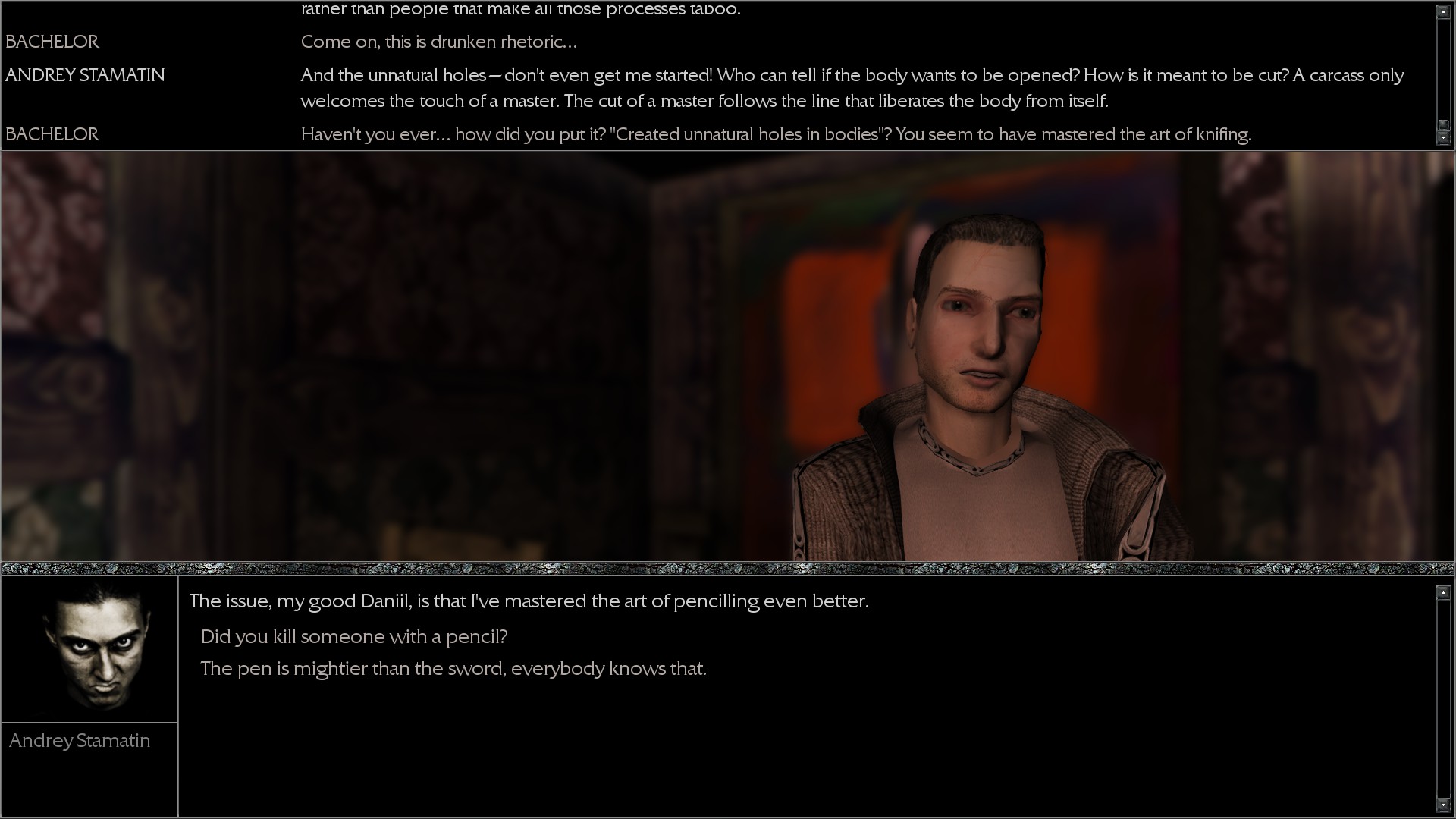
Bachelor: Haven't you ever... how did you put it? "Created unnatural holes in bodies"? You seem to have mastered the art of knifing.
Andrey Stamatin: The issue, my good Daniil, is that I've mastered the art of pencilling even better.
Bachelor: Did you kill someone with a pencil?Having Extremely High or Extremely Low Empathy
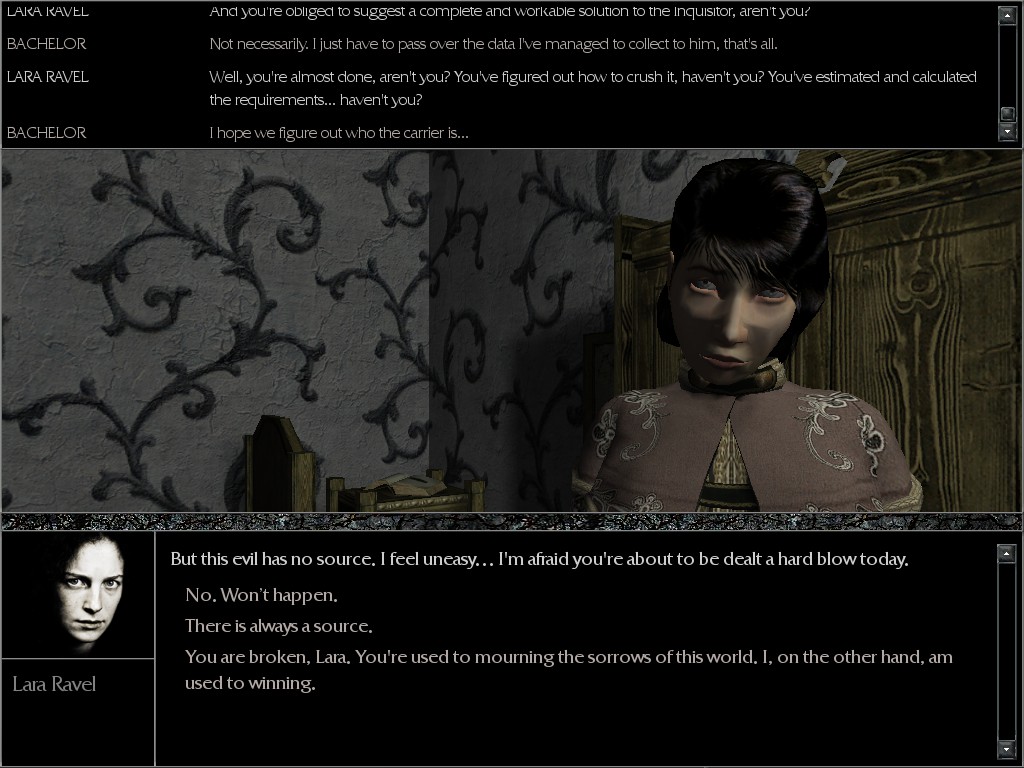
Lara Ravel: But this evil has no source, I feel uneasy... I'm afraid you're about to be dealt a hard blow today.
Bachelor: You are broken, Lara. You're used to mourning the sorrows of this world. I, on the other hand, am used to winning.Getting Very Attached to [...] Inanimate Objects
Difficulty with Emotional Regulation
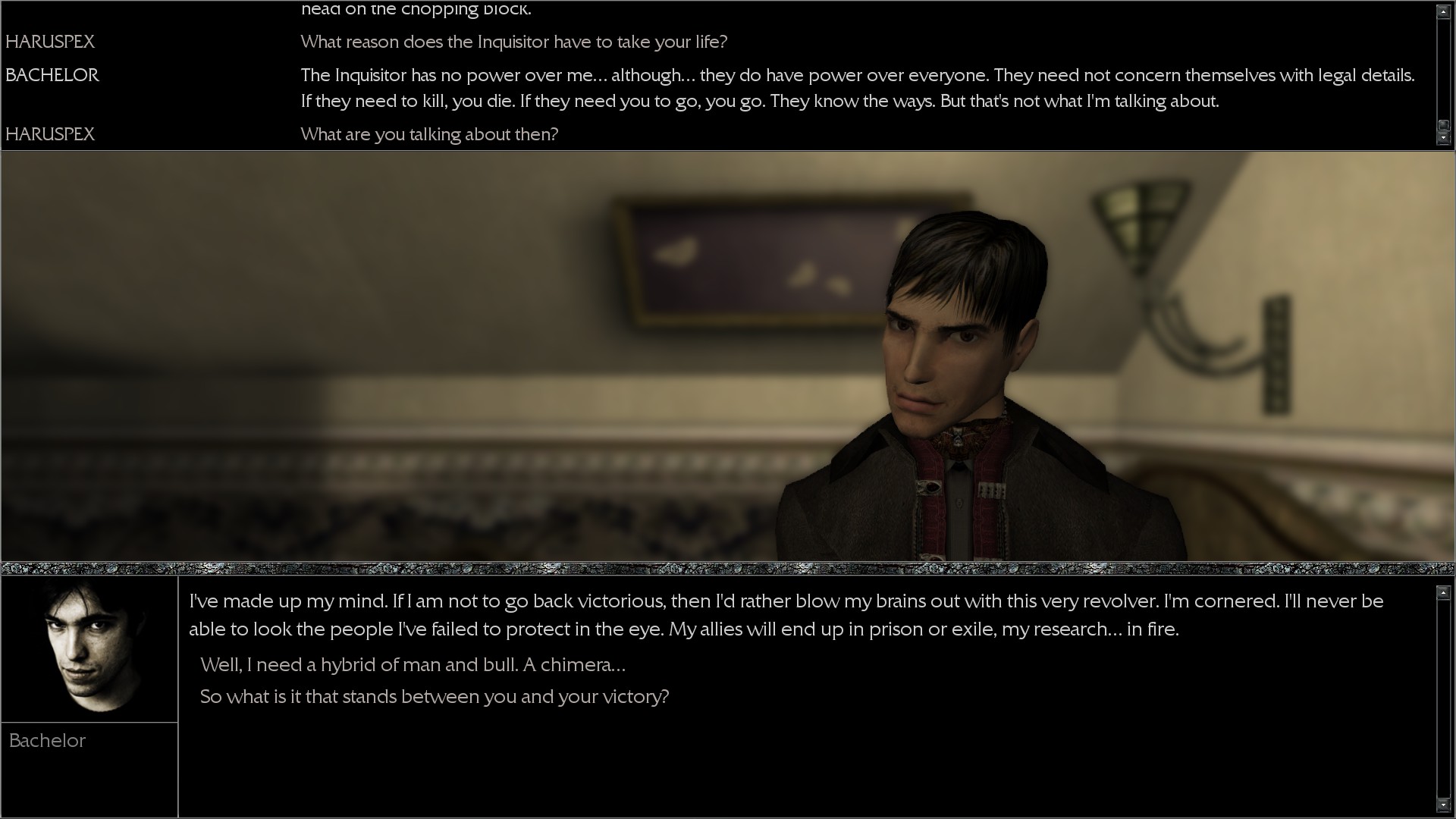
I've made up my mind. If I am not to go back victorious, then I'd rather blow my brains out with this very revolver. I'm cornered. I'll never be able to look the people I've failed to protect in the eye. My allies will end up in prison or exile, my research... in fire.
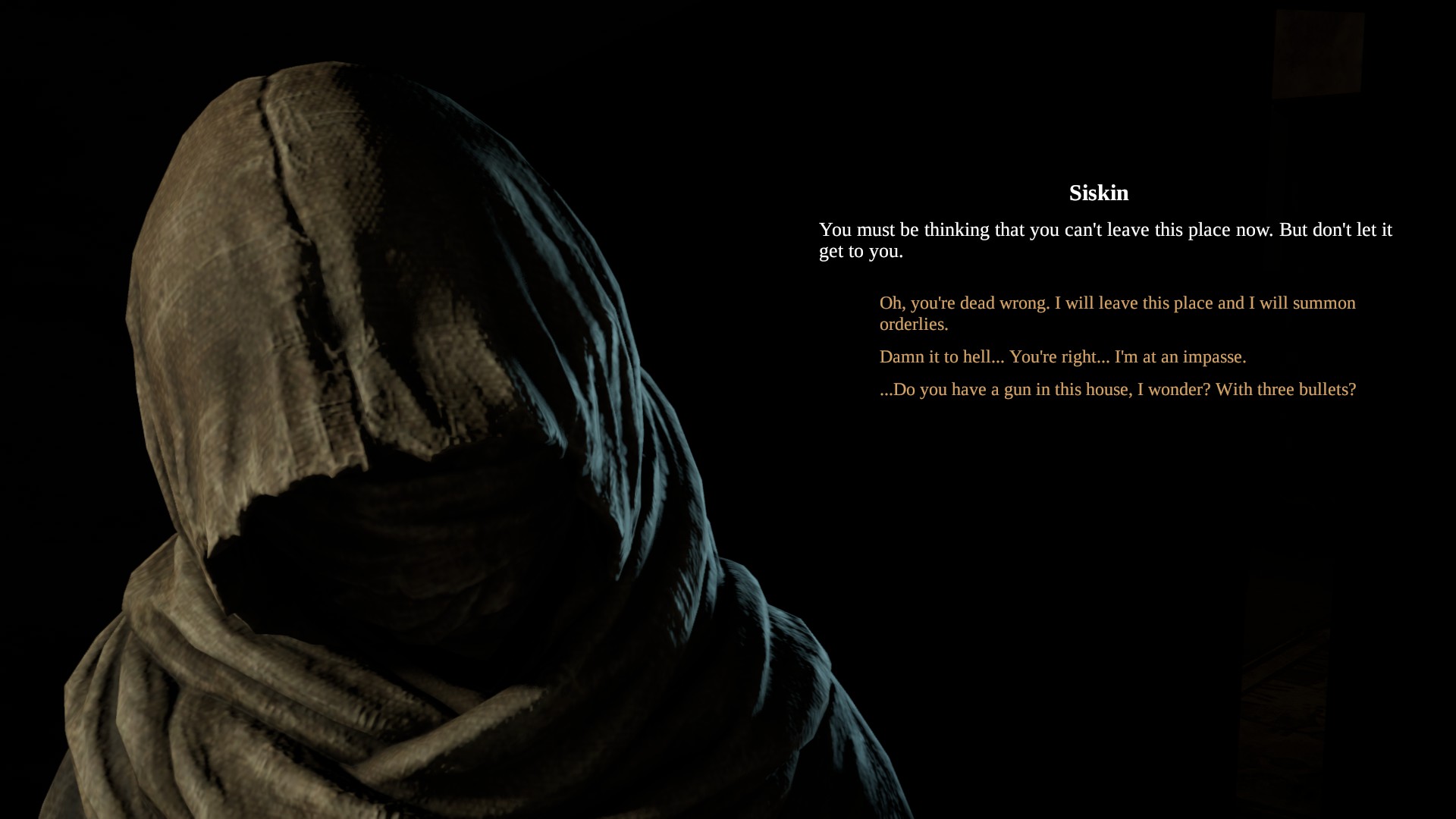
Siskin: You must be thinking that you can't leave this place now. But don't let it get to you.
Bachelor: ...Do you have a gun in this house, I wonder? With three bullets?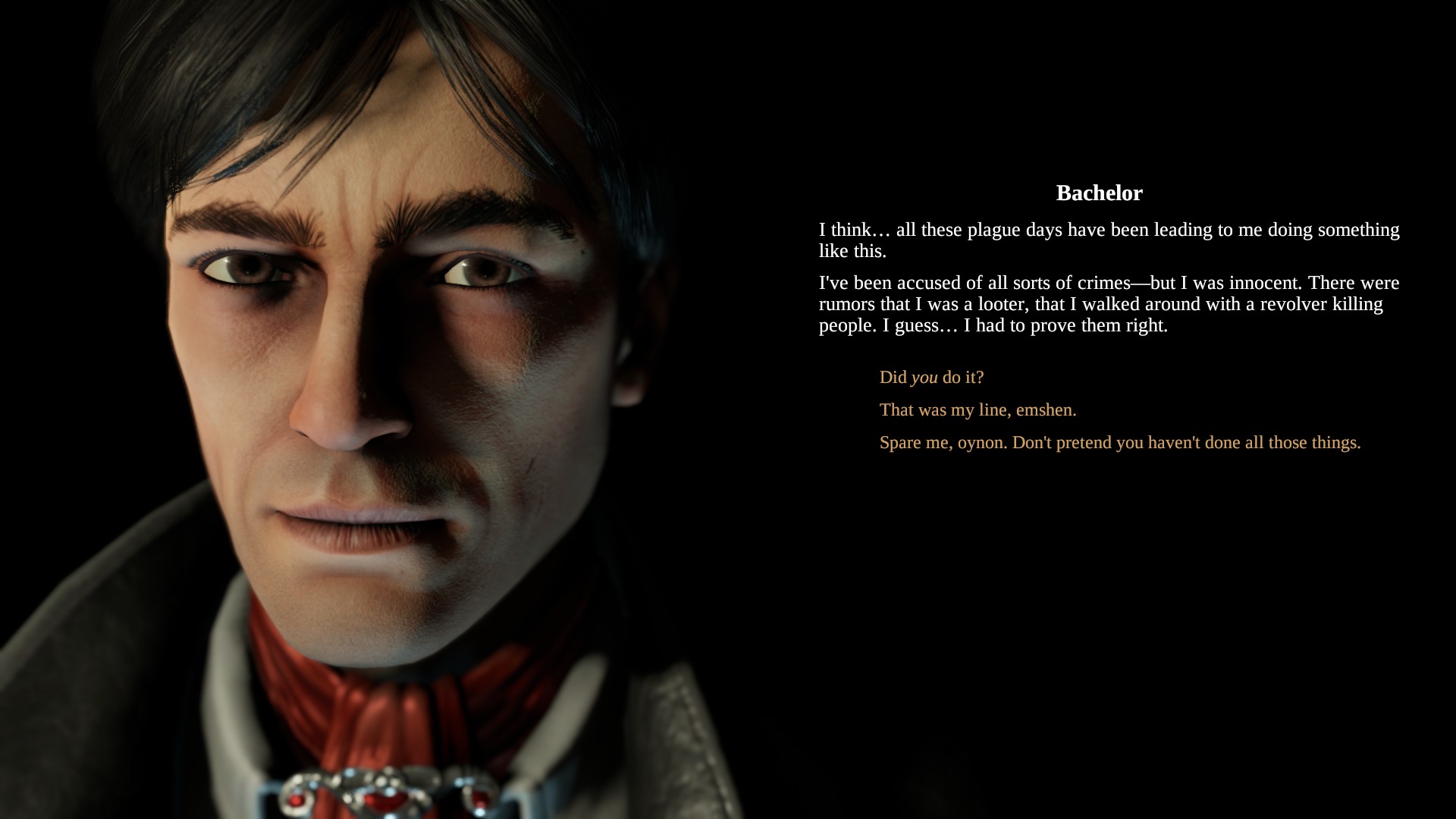
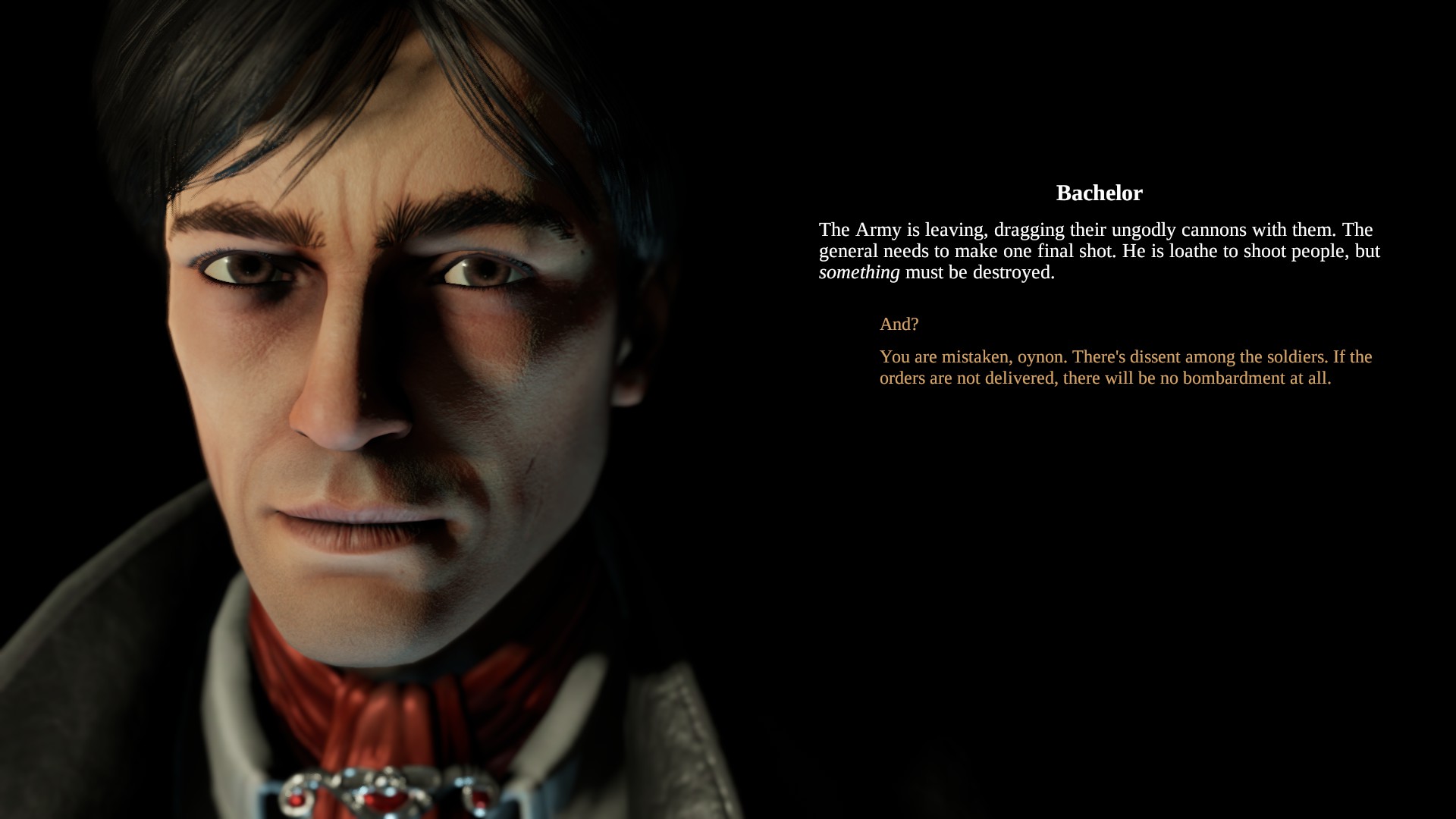
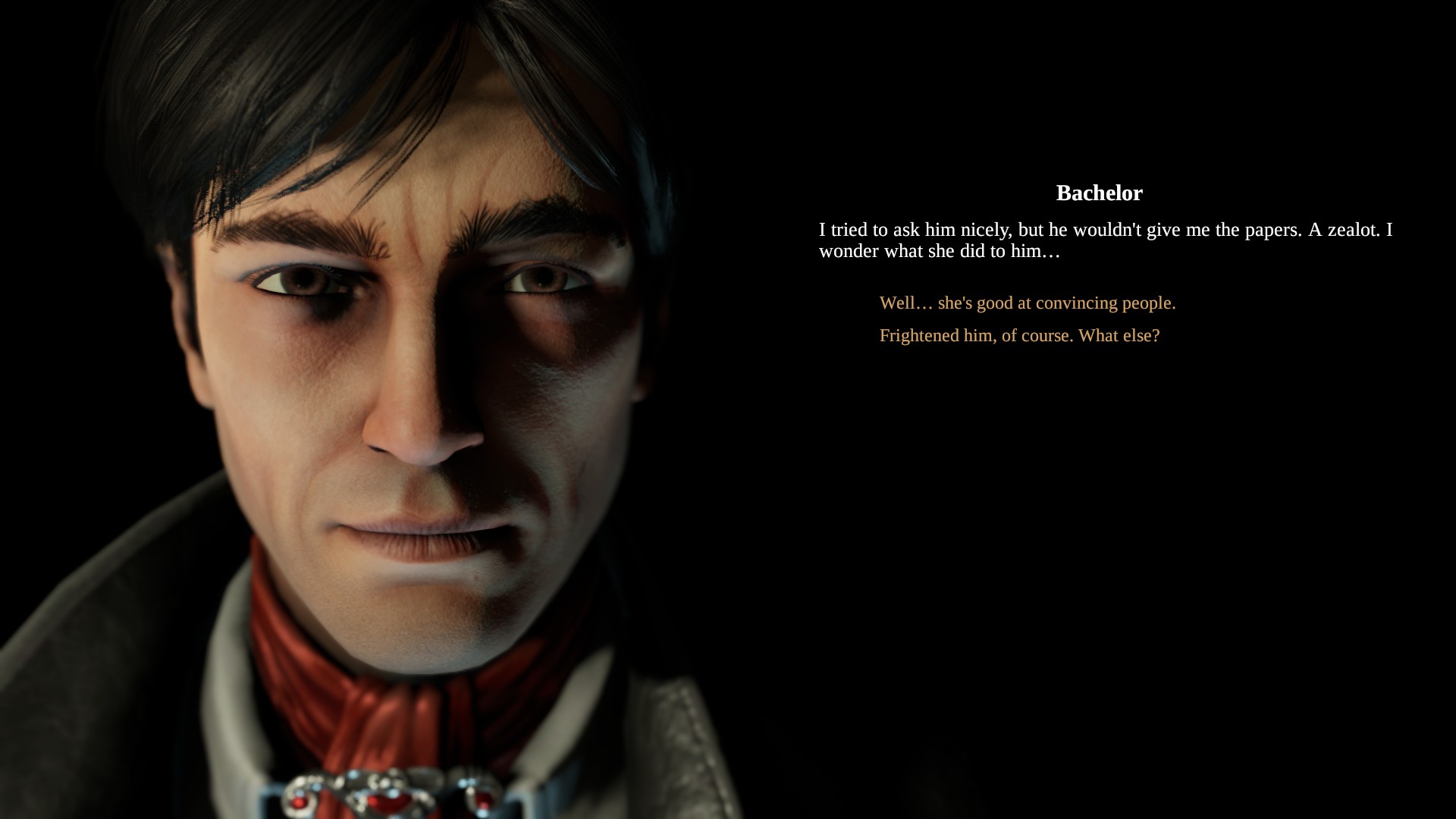
Bachelor: I think... all these plague days have been leading to me doing something like this.
I've been accused of all sorts of crimes - but I was innocent. There were rumors that I was a looter, that I walked around with a revolver killing people. I guess... I had to prove them right.
Haruspex: Did you do it?
Bachelor: The Army is leaving, dragging their ungodly cannons with them. The general needs to make one final shot. He is loathe to shoot people, but something must be destroyed.
Haruspex: And?
Bachelor: I tried to ask him nicely, but he wouldn't give me the papers. A zealot. I wonder what she did to him...
Haruspex: Frightened him, of course. What else?
Bachelor: See the ashes over there, on the floor? Barely managed to do it before you arrived. Smart of me to burn them rather than eat them, I think. You're a surgeon - you would have dug it all out of my gut.
Haruspex: Unlike you, I don't kill people for papers.Having an 'Unusual' Speaking Style
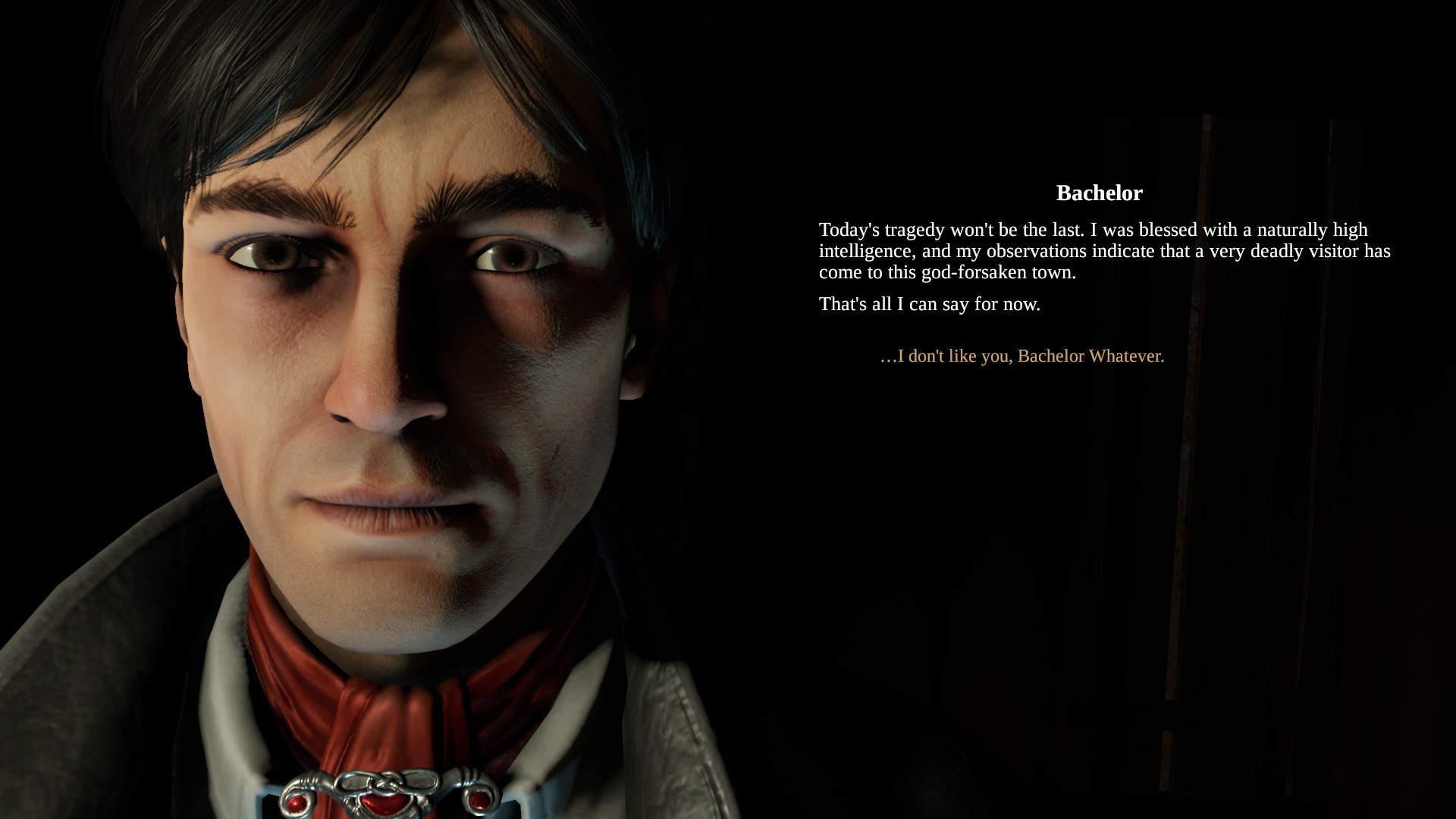
Bachelor: Today's tragedy won't be the last. I was blessed with a naturally high intelligence, and my observations indicate that a very deadly visitor has come to this god-forsaken town.
That's all I can say for now.
Haruspex: ...I don't like you, Bachelor Whatever.Pre-Scripting Conversations
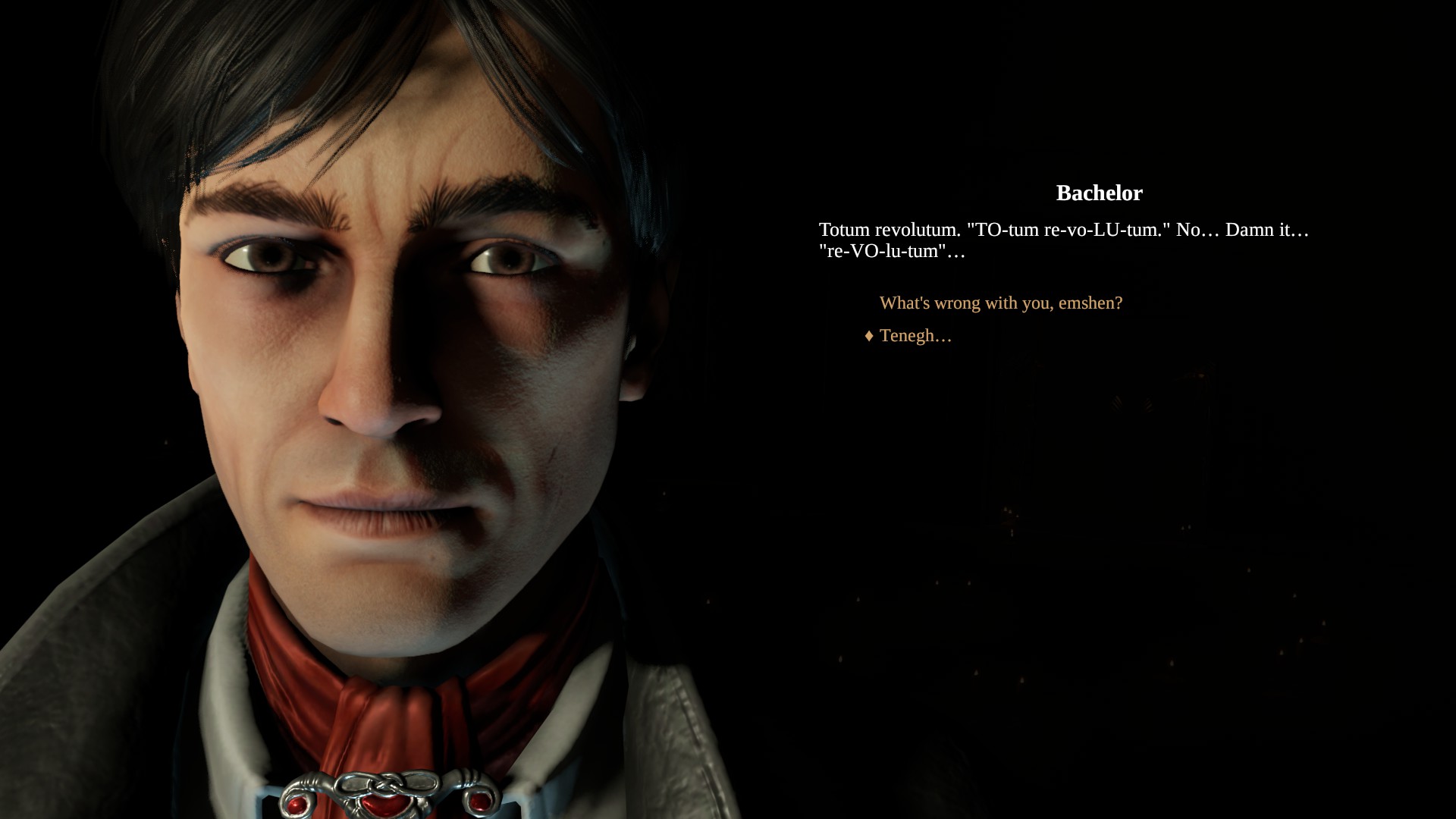
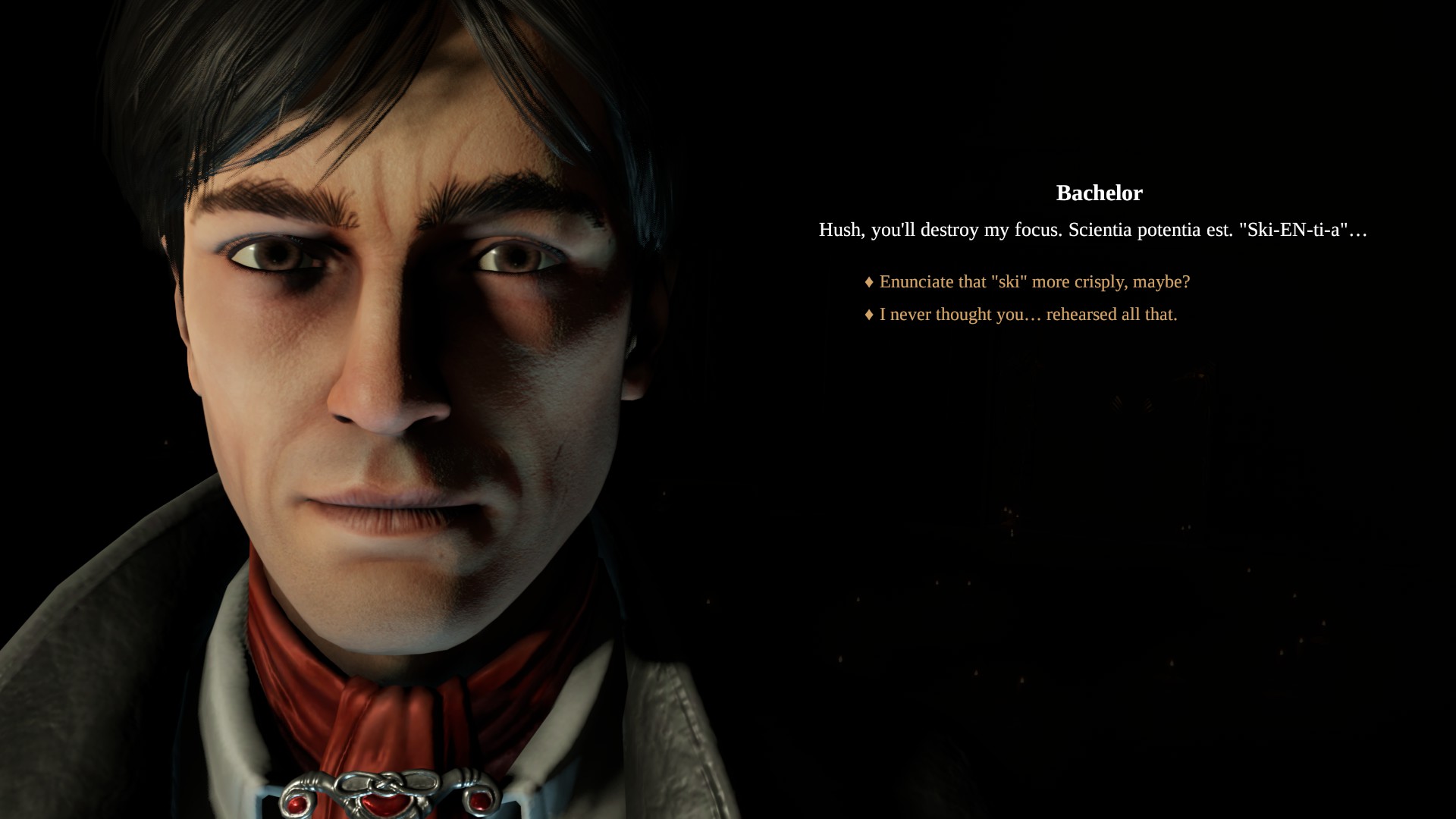
Bachelor: Totum revolutum. "TO-tum re-vo-LUt-um." No... Damn it... "re-VO-lu-tum"...
Haruspex: What's wrong with you, emshen?
Bachelor: Hush, you'll destroy my focus. Scientia potentia est. "Ski-EN-ti-a"...
Haruspex: I never thought you... rehearsed all that.'Quoting' Things
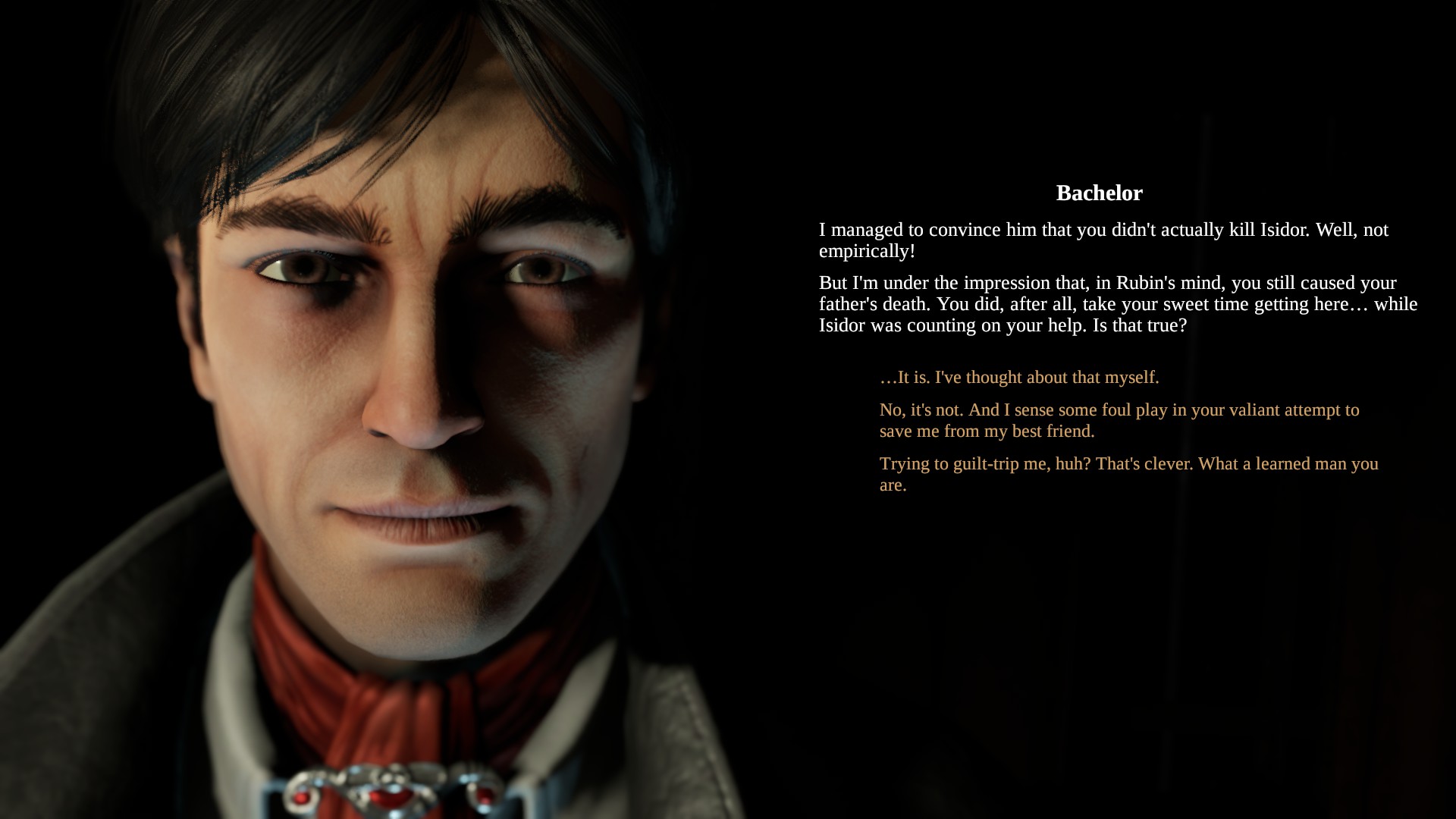
I managed to convince him that you didn't actually kill Isidor. Well, not empirically!
But I'm under the impression that, in Rubin's mind, you still caused your father's death. You did, after all, take your sweet time getting here... while Isidor was counting on your help. Is that true?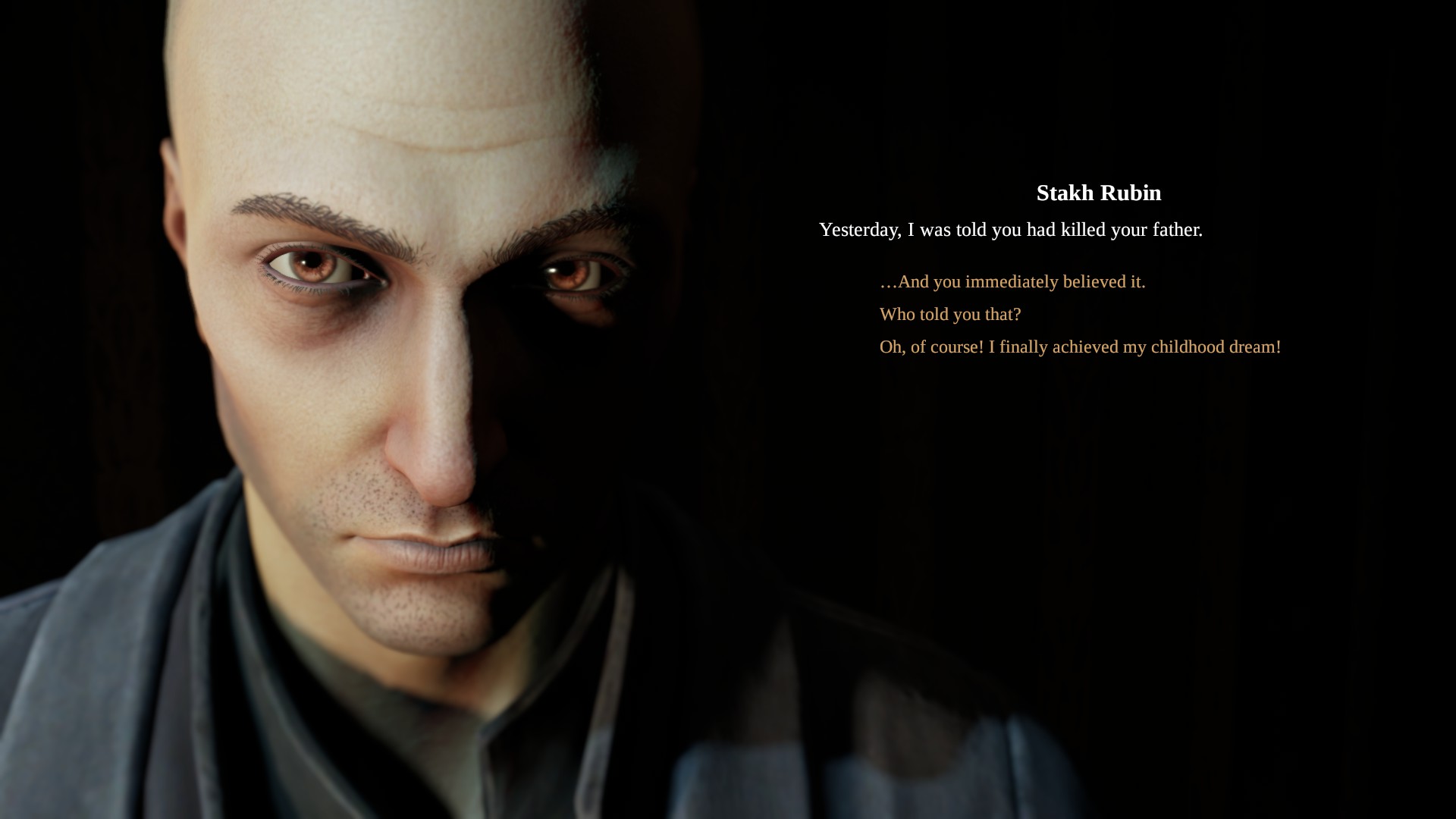
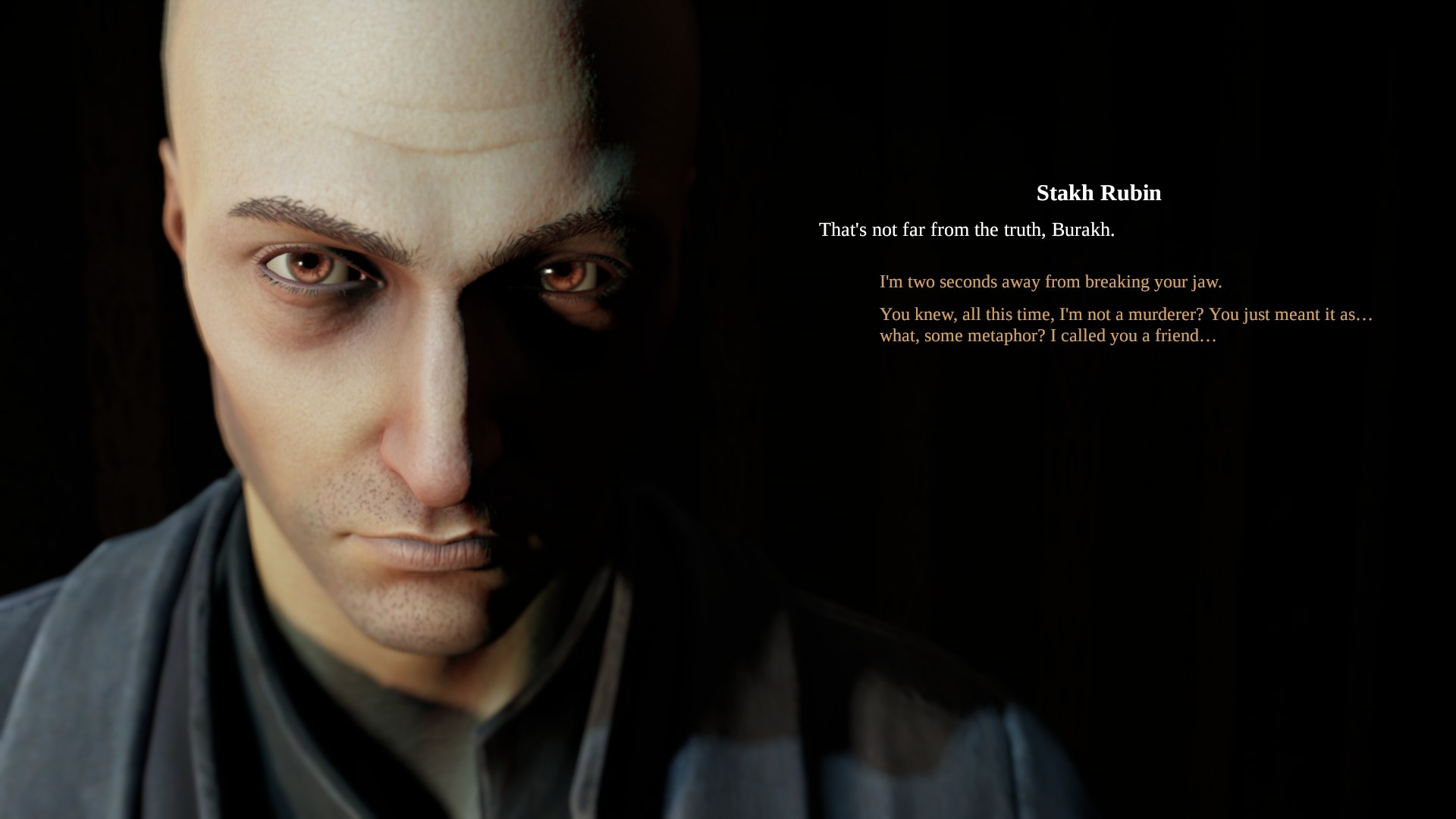
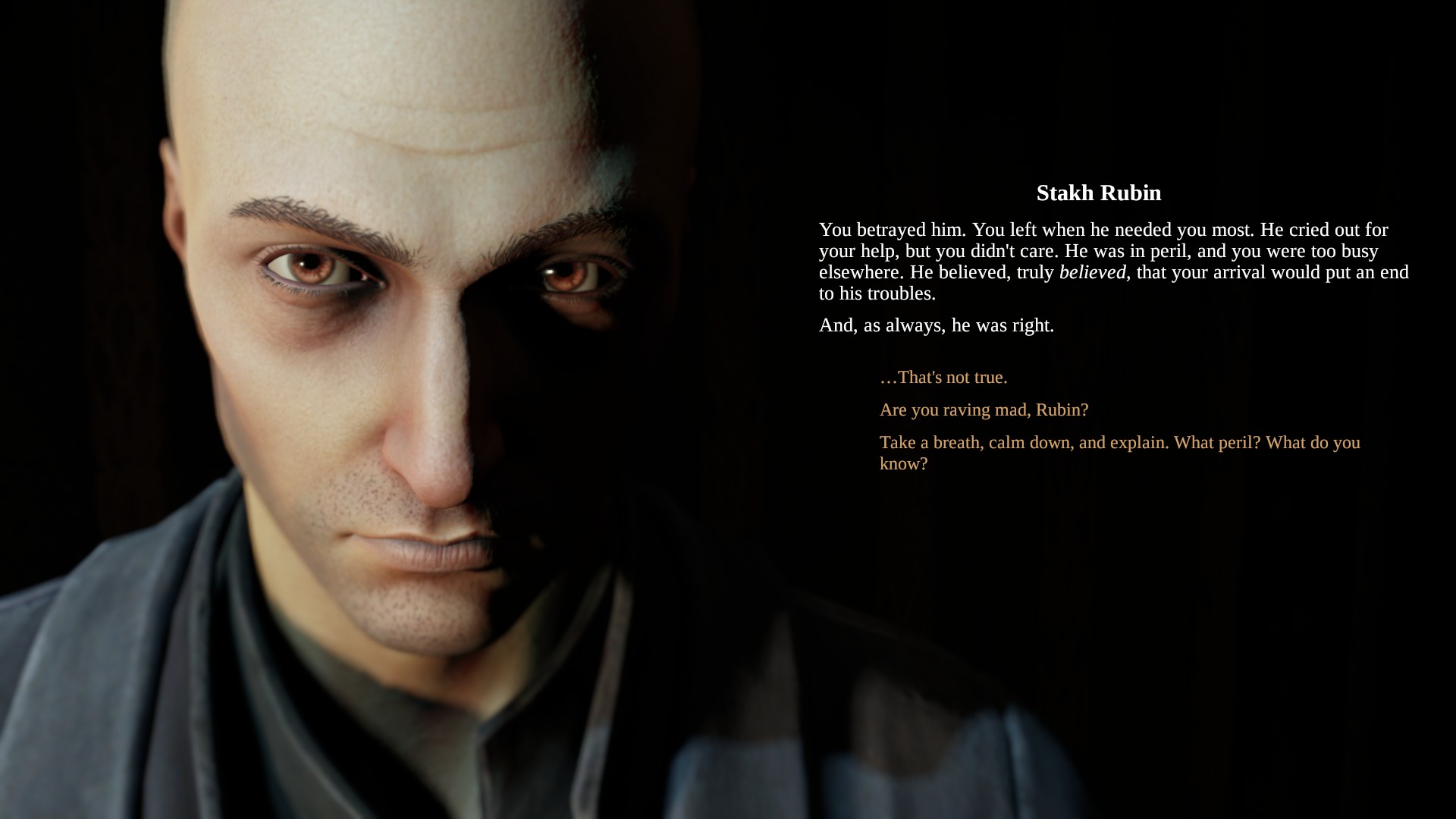
Stakh Rubin: Yesterday, I was told you had killed your father.
Haruspex: ...And you immediately believed it.
Stakh Rubin: That's not far from the truth, Burakh.
Haruspex: You knew, all this time, I'm not a murderer? You just meant it as... what, some metaphor? I called you a friend...
Stakh Rubin: You betrayed him. You left when he needed you most. He cried out for your help, but you didn't care. He was in peril, and you were too busy elsewhere. He believed, truly believed, that your arrival would put an end to his troubles.
And, as always, he was right.
No reason... Hopefully those are only silly rumors.
Forget it, Burakh. I have a splitting headache. If you have no urgent business, then we'll talk later. Later, later... Qui non proficit, deficit.Conclusion